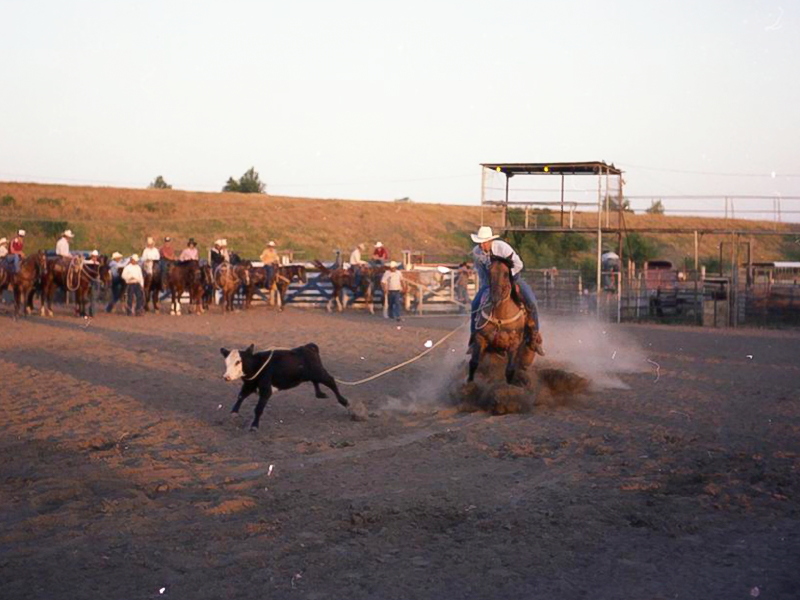
Through the Lenses of Ray Bankston and Don Shugart: Horse Photos from the UNT Libraries
The University of North Texas Libraries have acquired hundreds of thousands of photos from two photographers, Ray Bankston and Don Shugart, who documented the horse ranching industry for decades. They’ve compiled a selection of the photos into a book, Through the Lenses of Ray Bankston and Don Shugart. You may not know it, but Denton County is home to one of the largest concentrations of horse ranches in the world. There are over 350 such ranches in Denton County and many more in the surrounding North Texas area. In addition to housing one of the largest concentrations in the world, it’s also home to a huge diversity of horses. Thoroughbreds, American Quarter Horses, Arabians and Appaloosas can all be found. The University of North Texas Libraries have acquired hundreds of thousands of photos from two photographers, Ray Bankston and Don Shugart, who documented the horse ranching industry for decades. They’ve compiled a selection of the photos into a book, “Through the Lenses of Ray Bankston and Don Shugart.” The book will be available for purchase online in December. “I think it gives readers a glimpse into the history of horse ranching, which is such a big part of the north Texas economy,” said Kevin Hawkins, associate librarian at UNT. He said equine enthusiasts “will have a chance to see some photos of some ancestors of today’s most prominent horses.” Hawkins helped coordinate the production of the book. Part of his role at UNT is to promote the unique collections that UNT Libraries houses. “Through the Lenses of Ray Bankston and Don Shugart” is the first book UNT Libraries is producing to do that. “It’s a rich set of materials that we think most people don’t know exists,” Hawkins said. Dana Lodge, the director of sales at the Denton Convention and Visitors Bureau, directs tours of the horse ranches in the area and is an expert on the industry. She said the main reason there are so many horse ranches in the area is the sandy loam soil of the North Texas region. Mud is bad for horse hooves, and it can damage a horse’s health and show quality. But sandy loam soil drains immediately and neutralizes that threat to the horses. That’s what allows the industry and community to thrive in North Texas. “I think it’s a really large part of our history,” Lodge said. “It’s our largest source of agricultural economic income. It’s a really important, viable industry. And people don’t realize its right here in our own back yard. ‘Through the Lenses’ shows an awareness that the horse ranch industry is here and how important it is to us.” Don Shugart started photographing horses in 1972. He’s a Dallas-Fort Worth native but now lives in Oklahoma where he continues to add to his collection of equine photography. Shugart specializes in horse portraits, which may sound easier than it actually is. For every shot, Shugart had to make sure the horse looked perfect: straight legs, no stray hairs, eyes on the camera and head held high. “There were times I wanted to kill them, but I’ve enjoyed every minute of it,” Shugart said. “It’s kind of nice being able to make a living doing what you enjoy. I enjoy meeting the people that own them and ride them. It’s always my goal to make their horses look better than they are.” Shugart said he got into horse photography because there was always an event going on in the area that needed a photographer. Ray Bankston had been working the scene for a decade by the time Shugart arrived, but they were able to work together in harmony. “You have to realize there are so many horse people around, no one photographer is going to satisfy all of them,” Shugart said. “We were in competition but we weren’t in competition at the same time. I’ve helped him, he’s helped me. We have a real good relationship.” Bankston said he entered the industry by accident. He had been interested in photography since the 7th grade, but it wasn’t until a man asked him to take a photo of the winning horse at a race he was attending that Bankston realized he might make a career of it. After the race, Bankston took the photos of the horse and began walking off. The man stopped him and told Bankston he wanted a copy of the photo. Bankston got the specifications and then walked off again. The man stopped him again and asked, “Hey, don’t you want your money?” Bankston nodded his head in surprise. “How much do you charge?” the man asked him. Bankston didn’t have an answer. “Well, I normally pay $3.50 for the first copy and then $3 every copy after that,” the man said. Bankston agreed and walked away from the deal with $12.50. Another man approached him and asked him to shoot some photos of his horse as well. Bankston, ever the businessman, replied, “Sure, it’s $3.50 for the first copy and then $3 for every copy after that.” It was all business after that. Bankston bought a mobile home that he converted into a black room. He and his wife, Joyce, who together formed Dalco Photography, would go out to the horse shows and develop the photos on site for customers. “She did all the work, I just took the pictures,” Bankston said. “I couldn’t have done it without her. She printed the pictures and handled all the business. I wouldn’t be able to make it without her.” Sally Harrison, who has documented the North Texas horse ranch scene as a writer and photographer for years, wrote the introduction and captions for the book. She said the majority of her work came through working through UNT Libraries extensive collection of photographs, documenting the photos and identifying the horses in each photo. She spent long days at the Special Collections library looking over the photos with a desk lamp on and a magnifying glass in her hand. “I think a lot of people that are interested in horses will be interested in seeing some of these images have never been published before,” Harrison said. “I think it will be interesting for the general public too because of the cowboy and the American image contained in the photos. This is a nice collection of the last half of the last century, and it shows how the times have changed.” Article by Caleb Downs, UNT News Service Featured Image: Man roping calf at North Texas Cutting Horse Association Finals. Photo credit: Ray Bankston, 1963. external_relations_in_the_news
Posted:
12/17/2015

Doug Campbell Receives ALA's I Love My Librarian Award
Doug Campbell, Library Learning Services Librarian, is one of 10 recipients of the I Love My Librarian Award. The awards announced recently by the American Library Association and the Carnegie Corporation of New York honor “exceptional public service” and include a cash prize for each winner. Librarians are nominated by patrons, with more than 1,300 submissions turned in for 2015. Congratulations, Doug! To learn more, please see Award Honors 2 North Texas Librarians & 8 Others Across U.S. Photo credit: Brian Rowe external_relations_in_the_news
Posted:
12/04/2015
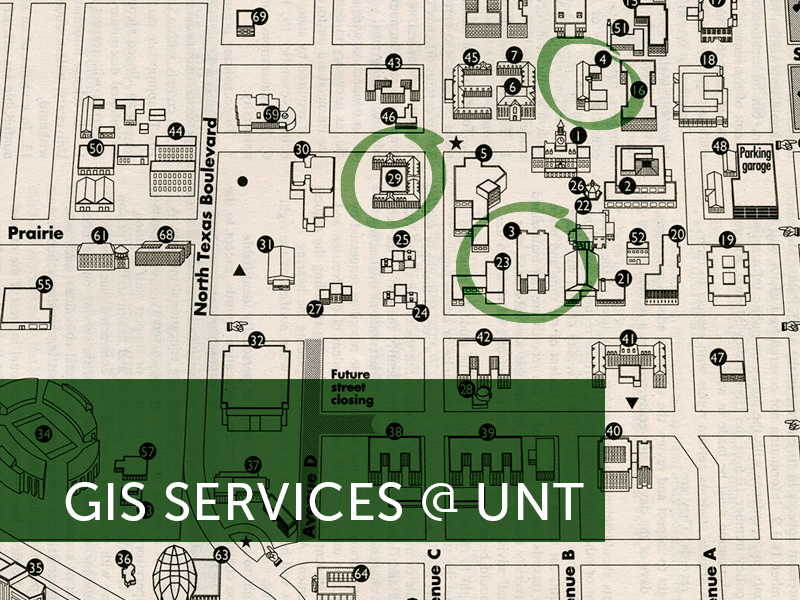
Mean Green Mapped
The University of North Texas Libraries are proud to unveil Mean Green Mapped! Mean Green Mapped is an interactive web map utilizing GIS software to illustrate UNT’s history through photographs and other media. Using historic maps, aerials and photographs, we seek to generate interest in the resources available at UNT Libraries and to commemorate UNT’s 125 years of service to students and community. The Project The University of North Texas Libraries are proud to unveil Mean Green Mapped! Mean Green Mapped is an interactive web map utilizing GIS software to illustrate UNT’s history through photographs and other media. Using historic maps, aerials and photographs, we seek to generate interest in the resources available at UNT Libraries and to commemorate UNT’s 125 years of service to students and community. Using the ArcGIS Online platform, visitors will be able to see points of buildings, both existing and historic, in their place in time with historic and modern photographs. Additionally, historic maps dating back to 1891 and aerial photography captured as early as the 1940s will further demonstrate how campus has evolved over time. This particular presentation of UNT’s resources has not been attempted before. Hopefully, you will enjoy your visit! Continuing Work There are many avenues of research as well as sources for new, relevant materials for this project. We will continue to explore and expand resources as they are identified. We also acknowledge that there may be gaps in the data or conflicting information based upon what we currently have digitized. This project is intended to be a living document that brings together the collective resources of the UNT Libraries, alumni and the Denton community. For example, in the next phase of the project, one element we would like to include is music samples to enrich the photography and maps we already have since UNT has a world-renowned music program, notably jazz. Additional maps that were not able to be georeferenced for the web map are: Bulletin of NTSU, 1968 Bulletin of NTSU, 1976 UNT Campus Map, 1999 UNT Campus and Parking Map, 2014-2015 Tell Us More If you have photographs or stories you would like to share, please contact gis@unt.edu. In fact, the more contributions we have, the more interesting Mean Green Mapped will be! We look forward to hearing from you. Project Team Roberta Sittel – Head, Eagle Commons Library and Government Documents Librarian Douglas Burns – GIS Librarian Arya Hackney – GIS Student Assistant Garret Rumohr – Web Services System Administrator Contributors Historical information, data, maps, and photography are provided by UNT Libraries, with a special thanks to the UNT Libraries Special Collections team for providing access to archival materials. The UNT Libraries Digital Projects Unit provided assistance by digitizing archival materials, which will be made publicly available on the Portal to Texas History. Modern photography has been provided by UNT’s Division of University Relations, Communications and Marketing (URCM). Hardware and software support has been provided by UNT Libraries Technology and Computer Operations (Lib-TACO) and UNT Facilities. Support for Mean Green Mapped has also come from a 2015 Green Light to Greatness grant award. Software Software utilized to support this project includes: ArcMap 10.3, ArcServer 10.3, ArcGIS Online (Organizational Account) and GlobalMapper 16.2. Resources La Forte, Robert S., and Richard L. Himmel. Down the corridor of years: A centennial history of the University of North Texas in photographs, 1890-1990. 1st ed. Denton: University of North Texas Press, 1989. Rogers, James L. 2002. The story of North Texas: From Texas Normal College, 1890, to the University of North Texas system, 2001. Denton: University of North Texas Press, 2002. “The Portal to Texas History.” University of North Texas Libraries. Last modified September 29, 2015. https://texashistory.unt.edu/ “University Libraries.” University of North Texas Libraries. Accessed October 09, 2015. http://www.library.unt.edu/ “University Relations, Communications & Marketing.” University Relations, Communications & Marketing. Accessed October 09, 2015. http://urcm.unt.edu/ Please Note Please note that, while every effort was made to ensure accuracy of data, the quality of information varies and accuracy cannot be guaranteed. public_services_collection_highlight
Posted:
11/19/2015
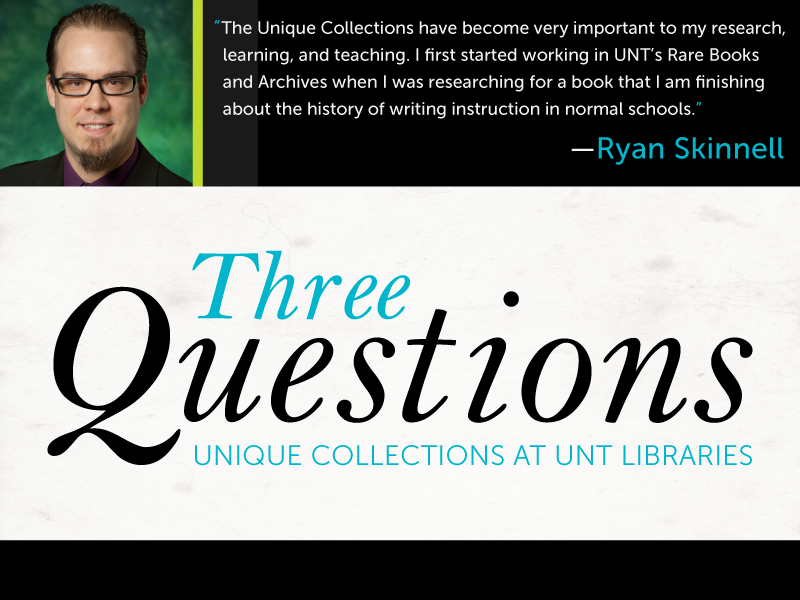
Three Questions with Ryan Skinnell, Assistant Professor at San José State University
Ryan Skinnell is an assistant professor of Rhetoric and Composition in the Department of English at San José State University. He was formerly an assistant professor in the English Department at the University of North Texas, where he taught courses in the rhetoric and writing concentration. Three Questions is an initiative to share the value that our faculty, students, and others in the UNT community derive from using the Unique Collections at UNT Libraries. How important are Unique Collections in your teaching, learning or research? The Unique Collections have become very important to my research, learning, and teaching. I first started working in UNT’s Rare Books and Archives when I was researching for a book that I am finishing about the history of writing instruction in normal schools. The archival materials about UNT’s early history, including course catalogs and administrative materials, were really crucial to the success of that project. In the process of doing that research, I also started to think about the pedagogical value of students working with those materials, but I didn’t have a clear plan for bringing UNT’s Special Collections into my courses. Then, a few years ago I got involved in a project with some of my colleagues, Gabriel Cervantes, Dahlia Porter, and Kelly Wisecup. The project involved researching ways that bureaucracy structures human knowledge. For instance, we were curious about how bureaucratic forms, like taxonomies or membership applications, shape how human beings think and act. During the course of that project, we started to work with Special Collections librarians to curate a special exhibit to display some of our findings. For the exhibit, called “Bureaucracy: A Love Story,” we drew materials from the Rare Books and Archives collections that illustrated bureaucratic knowledge. Part of the process involved describing the materials for the physical exhibit and for an online exhibit (https://exhibits.library.unt.edu/bureaucracy-love-story/). Dr. Porter and I thought it was a good chance to design assignments for courses we were teaching in Fall 2014 to get students into the Special Collections to do research on the materials we selected and contribute to the special exhibit. All the students participated and really did amazing work. How have Unique Collections changed the way you approach your research, teaching or learning? I suppose the biggest change has been my attitude toward to separation of my research and from students’ research. That is, I’ve always conceived of my research as somewhat different from the kinds of research I want students to do in my classes. Mostly this is because my research is pretty specialized and the research I assign tends to be much more generally applicable. But working with students on the bureaucracy exhibit pushed me to rethink that separation and whether it is even useful. What do you want others to know about your research? As I said, my research is relatively specialized—I study the history of writing instruction in American colleges and universities and have related research in bureaucracy and institutional rhetoric—basically how institutions use language like boilerplate to accomplish goals. At a glance, these areas of study are pretty dry, and in fact, it is not uncommon for people to call the things I study boring. What I tell those people, and what I want others to know, is that boring things are worth studying because they are boring. If studying bureaucracy has taught me anything, it is that boring things are only boring because they are so common as to be taken for granted. As a result, boring things can set limits on the things we think, the ways we act, and the values we hold. What I hope my research does is bring those things back into view so we can decide if we really think those limits are good or necessary. Ryan Skinnell is an assistant professor of Rhetoric and Composition in the Department of English at San José State University. He was formerly an assistant professor in the English Department at the University of North Texas, where he taught courses in the rhetoric and writing concentration. While he was at UNT, he also taught a “writing for publication” faculty seminar in Islamabad, Pakistan as part of partnership between the University of North Texas and the National University of Modern Languages-Islamabad. He is the co-editor of What We Wish We’d Known: Negotiating Graduate School (Fountainhead Press, 2015), and his monograph, Conceding Composition: An Alternative History of Composition’s Institutional Fortunes, is forthcoming with Utah State University Press. external_relations_in_the_news_three_questions
Posted:
11/19/2015

UNT Libraries support editors who declare independence from commercial publishers
All six editors and all 31 members of the editorial board of Lingua, a top journal in linguistics published by Elsevier, resigned in late October and plan to launch a new journal, Glossa, in 2016 that will still be peer-reviewed but entirely free to read online (see coverage in Inside Higher Ed). The move, just the latest by a journal editorial board “declaring independence,” attracted not only attention in the popular press but also an expression of support from the Association of Public and Land-grant Universities. The UNT Libraries offer a number of services to help scholarly editors and authors based at UNT to understand their rights in working with publishers and to support alternative forms of publishing and how to assess invitations to publish. Highlights include: UNT Scholarly Works: a repository for UNT faculty and staff to deposit the results of their research, whether published elsewhere or not UNT Data Repository: a central archive for the datasets of UNT researchers Copyright Advisory Services helps authors understand how copyright and licensing work and what they can ask to retain before signing a publishing agreement Editors’ Roundtable: a group that meets over lunch once a semester to share experiences and learn about best practices Scholarly Open Access E-Journal Support: a service to make scholarly journals edited at UNT free to read online Eagle Editions: an imprint for works of scholarship that complements the UNT Press The UNT Libraries also promote awareness of open access (making works of scholarship freely available while maintaining their quality and peer review) every year by hosting events during International Open Access Week and by organizing an Open Access Symposium that attracts speakers and attendees from around the world. Mark your calendars now for the next symposium: May 19–20, 2016. did_you_know
Posted:
11/17/2015
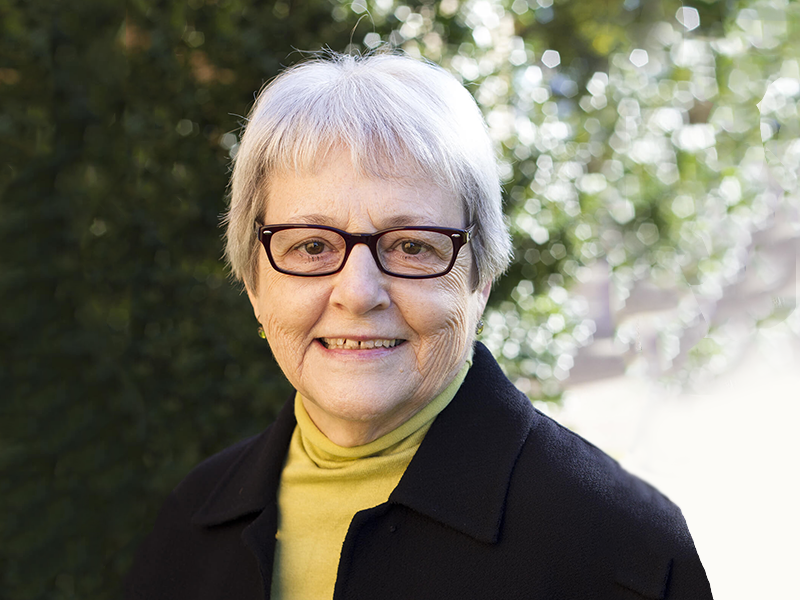
Cathy Nelson Hartman to Retire in December
Cathy Nelson Hartman will retire after a distinguished career at UNT at the end of December 2015. Recently, Cathy Nelson Hartman announced her decision to retire after a fruitful, visionary and distinguished career at UNT. She will be with us until the end of December 2015, and in 2016 will be continuing on in a volunteer capacity on the Library Advocacy Board. Her impact on her discipline at the local, national, and international levels is demonstrated through more than $6 million in externally funded projects and research and leadership in professional organizations. Cathy started her career at UNT in 1995 as a Documents Librarian in the Government Documents department, and her time there was dedicated to the fundamental principle that the public has the right to reliable and permanent public access to government information regardless of format. Through her leadership, UNT forged partnerships at multiple levels to preserve the public record. The Texas Secretary of State’s office worked with Cathy to preserve and provide permanent access to the Texas Register, and a formal partnership with the Texas State Library and Archives Commission further secured important Texas state electronic records. At the national level, UNT is known in the Government Documents field for two ground-breaking programs she initiated, the CyberCemetery and the End-of-Term Presidential web harvests of the .gov domain. The CyberCemetery captured the websites of defunct federal agencies and commissions, and UNT alone held a copy of this information critical to the national record. Due to Cathy’s foresight in preserving vital government-related digital collections, the UNT Libraries exist as one of only ten Affiliated Archives of the National Archives and Records Administration (NARA), and is one of only three universities in the U.S. to hold that distinction, along with the U.S. Naval Academy and West Point. In 2015, the U.S. Government Printing Office named UNT as the Library of the Year. In 2002, Hartman launched her boldest initiative, The Portal to Texas History, a collaborative effort between Texas libraries, museums, archives, historical societies and educators to present Texas History materials online. Brenda Gunn with UT’s Dolph Briscoe Center for American History notes that, “Most historical documents never receive one moment of attention outside of an archives reading room.” Cathy forever changed that paradigm by placing unique, historically significant materials online for anyone to access. Since its humble inception, the Portal has grown to include over 300 cultural heritage partners across Texas and provides online access to nearly seven million digital files encompassing the rich history of our state. With over 600,000 visitors a month, the Portal serves up iconic treasures of Texas history to a global audience. In recognition of her national leadership in digital preservation, in 2011, Cathy was elected to the board of the International Internet Preservation Consortium, and in 2013 she served as the Chair of the Board. Nationally and internationally recognized in her field, a few of her awards include being named a “Digital Preservation Pioneer” by Library of Congress, and honored with a Documents to the People Award by the American Library Association and several other awards from professional associations. She’s also served on Advisory Boards for the Federal Depository Library Council (Chair, 2002-03), the Goddard Space Flight Center Library, as co-Chair of the National Digital Stewardship Alliance Content Working Group, Texas Records Management Interagency Coordinating Council, the preservation metadata standards group - PREMIS, and as founder of the Texas Heritage Digitization Initiative. As a Principal Investigator, Cathy was awarded grants from foundations, state and national agencies totaling over six million dollars in external funding during her career. She served as the Asst. Dean for Digital and Information Technologies from 2005-10, and became Associate Dean in 2010, taking on a pivotal role in managing library operations. In addition to bringing in substantial funding for UNT, Cathy has also given back. In 2012, she established the Cathy Nelson Hartman Portal to Texas History Endowment to enable UNT to extend the impact of the Portal by creating a permanent, sustainable source of income. Cathy’s exemplary service as a leader and visionary have impacted the information landscape, and brought positive recognition to UNT at the state, national, and international level. Please plan to join us on Thursday, December 10 at Harvest House in Denton at 5:00 p.m. and help us celebrate the extraordinary career of Cathy Nelson Hartman. Harvest House is located at 331 E Hickory St, 940-218-6148. We hope to see you there! external_relations_in_the_news
Posted:
11/16/2015
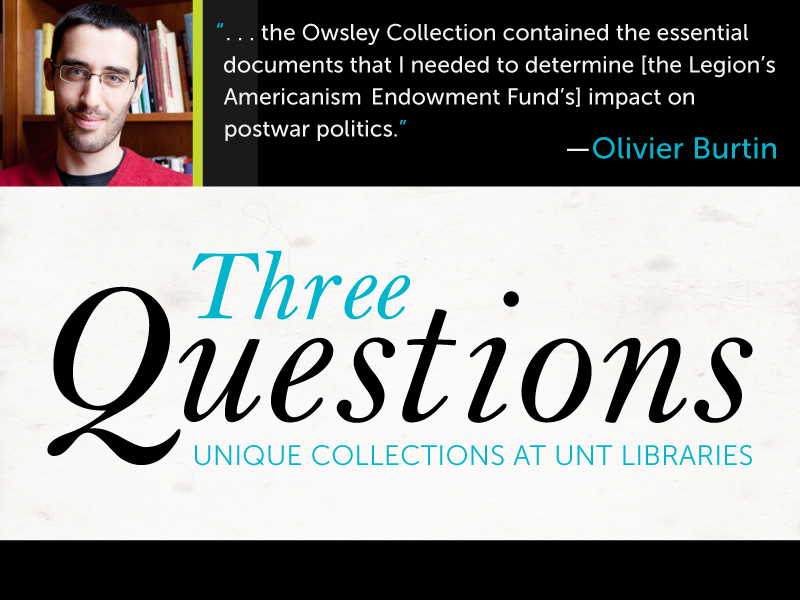
Three Questions with Olivier Burtin, Doctoral Student at Princeton University
Olivier Burtin is a fifth-year graduate student in History at Princeton University. He graduated from Sciences Po (Paris) in 2011 with a M.A. in History. Three Questions is an initiative to share the value that our faculty, students, and others in the UNT community derive from using the Unique Collections at UNT Libraries. How important are Unique Collections in your teaching, learning or research? I am writing a doctoral dissertation about the American Legion and veterans’ politics from World War II to the Vietnam era. A central goal of my project is to be more than just the institutional history of one organization and to use the Legion as a window into the broader cultural, political, and social dynamics of the “veteran community” in the postwar era. This is why, although I have conducted extensive research at the Legion’s own national archives in Indianapolis, I did not want to limit my perspective to these documents. Not only did I seek to avoid uncritically reproducing the “view from within” that this kind of organizational archives inescapably conveys, but I sought to tell a story that would not be only about the national level of the Legion’s bureaucracy. For all these reasons, I have put particular emphasis on gathering archives from some of the Legion’s local Posts and state chapters, as well as individual collections of the Legion’s National Commanders. Only a handful of the latter are available for the post-World War II period, which is why I was very happy to be able to visit Alvin Owsley’s at UNT. How have Unique Collections changed the way you approach your research, teaching or learning? Owsley was National Commander of the Legion in 1922-1923 and remained involved in the group’s activities throughout his life. His correspondence with other high-level Legion leaders provided me with invaluable insights into the inner workings of a group notorious (at the time) for being dominated by an elite core of “kingmakers.” More specifically, I sought to document his role as the Chairman of the Legion’s Americanism Endowment Fund. This fund was created in 1943 with an initial endowment of ten million dollars, in an effort to spread pro-business and anti-communist ideas in the United States in partnership with the National Association of Manufacturers. I am not aware of anyone having done prior research on the Fund, and the Owsley Collection contained the essential documents that I needed to determine its impact on postwar politics. What do you want others to know about your research? I am always surprised at how under-researched the history of U.S military veterans in the 20th century is. When I started my dissertation two years ago, I only had a vague idea that this field had been somewhat neglected by historians. I realize now that we have barely even touched the surface. There is so much to explore, in fact, that I had to decide early on where to put the limits of my project. If I had tried to be comprehensive, the result would probably have been not one but two or three dissertations. On the other hand, this challenge is precisely what I find most exciting about my research. I am not merely interpreting familiar events in an innovative way: rather, every chapter that I write is about something completely new that you won’t find in textbooks or even in the secondary literature on the period. Hopefully, more scholars will become interested in this topic in the future and help fill in the gaps that I was unable to cover. Olivier Burtin is a fifth-year graduate student in History at Princeton University. He graduated from Sciences Po (Paris) in 2011 with a M.A. in History. external_relations_in_the_news_three_questions
Posted:
11/10/2015
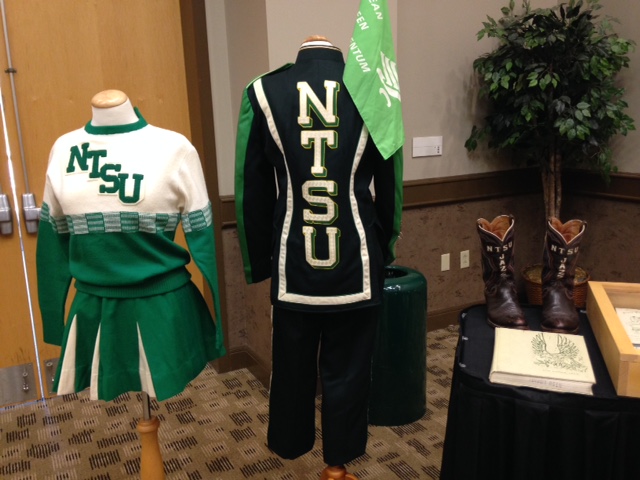
Do you have a piece of UNT history? We need your help!
Do you have a special or unique piece of UNT, NTSC or NTSU memorabilia from the 1940s – 2000s? Help us celebrate the 125th Anniversary of UNT by donating or loaning your UNT posters, photographs, apparel and related items for an upcoming exhibit at Willis Library, “Growing Up Green: UNT from WWII to Today.” The exhibit will be on display January 19th, 2016 - May 6th, 2016. Here is what we are looking for: Rare or one-of-a-kind university memorabilia Posters, flyers and handbills from university events Buttons, t-shirts and athletic uniforms Unique photographs of students, faculty and staff on campus or participating in university events like homecoming Photographs of famous UNT alumni while they were students: Mean Joe Green, Pat Boone, Larry McMurtry, etc. WWII or Vietnam recruiting posters, and photographs of students serving in the armed forces Underground or counter-culture student publications, anti-war or conscientious objector literature Other items you saved from your student days: postcards, ticket stubs, letters or mementos We are not seeking yearbooks, commencement programs or letter jackets at this time. Items selected for the exhibit will be part of the spring 2016 exhibit “Growing Up Green: UNT from WWII to Today” in the Special Collections reading room January 19th-May 6th and digitized for an online display. The names of contributors will be listed alongside their donations/loans in the exhibit and contributors will also be recognized during the exhibit opening reception. Our deadline for submissions has been extended! To submit an item for consideration, please email a description and/or digital photograph to the University Archivist by December 18th. For more information or to submit an item for consideration, please contact Morgan Gieringer, University Archivist and Head of Special Collections: morgan.gieringer@unt.edu 940-369-8657 special_collections_in_the_news
Posted:
11/04/2015
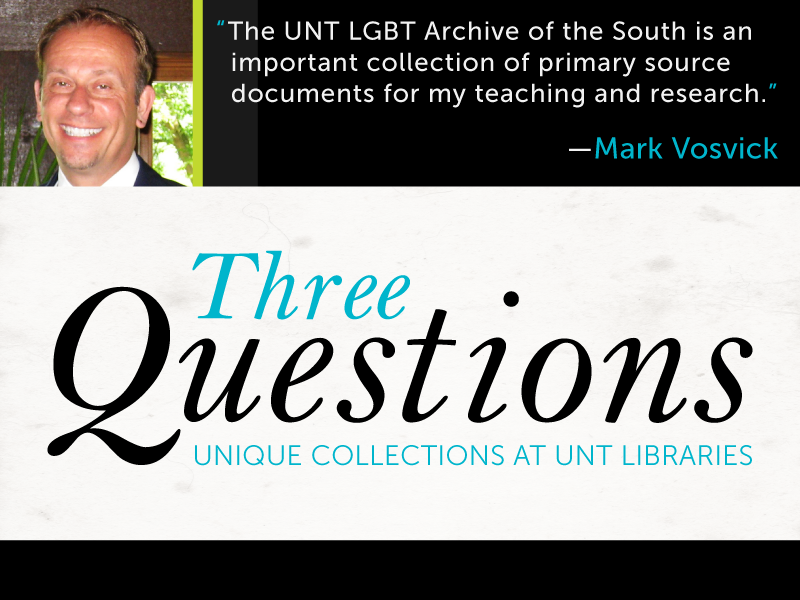
Three Questions with Mark Vosvick, UNT Assoc. Professor of Counseling Psychology
Dr. Mark Vosvick is a behavioral scientist and associate professor of counseling psychology in UNT’s College of Arts and Sciences. Vosvick trained at Yale, Rutgers, Harvard, Stanford and the Medical College of Wisconsin before coming to UNT. Three Questions is an initiative to share the value that our faculty, students, and others in the UNT community derive from using the Unique Collections at UNT Libraries. How important are Unique Collections in your teaching, learning or research? The UNT LGBT Archive of the South is an important collection of primary source documents for my teaching and research. As the director the LGBT Studies Program at UNT, the Archive is a resource I send students to who are preparing for various classes that address issues relevant to sexual and gender minorities, particularly here in the Dallas Fort Worth Metroplex. I teach two seminar courses, Biopsychosocial Issues in HIV/AIDS and Psychosocial Issues in LGBT Communities, in the Psychology department that prepares psychology majors and doctoral students to better work in the future with sexual and gender minorities by exploring the social, psychological and environmental complexities faced by members of these communities. The Archive provides a window for students into the realities of living in the South for gay men, lesbians, bisexuals and transgender people. The resource is invaluable to students who want to gain a deeper understanding of the stressors and barriers to care that this community experiences. As the director of the UNT Center for Psychosocial Health Research, my research program focuses on psychological and social health of people living with HIV/AIDS and/or people who identify as a sexual or gender minority. The rich material in the Archive provides context to my researchers about the populations here in DFW that we study. As more material in the collection is digitized access to these materials for research purposes is enhanced. Understanding the day-to-day circumstances that LGBT people experience in the South help researchers better develop interventions tailored to the communities here in DFW. How have Unique Collections changed the way you approach your research, teaching or learning? Most importantly, the LGBT Archive of the South allows students, researchers and healthcare providers to access material that documents the unique negative and positive experiences, over time, that members of the LGBT communities experience. Just as historically health researchers studied men and then inappropriately generalized findings to women, much research in the U.S. that draws samples from the U.S. coastal cities, ignores the geographic and cultural differences that sexual and gender minorities experience. The Archive can facilitate researchers and healthcare providers gaining insight into the unique factors (e.g. southern conservatism, the bible belt) that require LGBT communities to develop specialized coping strategies to manage the stressors associated with living in the South. Additionally, the creative ways documented in the Archive in which these communities have developed resilience to minority stress can offer important lessons for developing interventions that can be effective. The geographic and cultural influences to the psychological and social wellness has not been carefully studied and the Archive is an excellent resource to clarify the relevance of Southern living for LGBT people. What do you want others to know about your research? Now that people living with HIV/AIDS are living longer and enjoying more full lives, quality of life becomes an important dimension to target. The Center for Psychosocial Health Research explores how quality of life can be enhanced by managing stress, developing resilience and improving overall wellness.Similarly, we conduct research in communities closely tied to the HIV/AIDS epidemic in the U.S. – the LGBT and ethnic/racial communities. We are finding that the day-to-day stressors of living as a minority, regardless of seropositive status, are important contributors to wellness in these communities. Our objective is to identify factors that may be ameliorated through targeted interventions for these communities to improve overall quality of life. Dr. Mark Vosvick is a behavioral scientist and associate professor of counseling psychology in UNT’s College of Arts and Sciences. Vosvick trained at Yale, Rutgers, Harvard, Stanford and the Medical College of Wisconsin before coming to UNT. As a health psychologist, he directs the Center for Psychosocial Health Research, which is touted as the only Center of its kind in the South.Under his leadership, the Center trains undergraduate and graduate students in the behavioral sciences related to health and wellness in ethnic, racial, gender and sexual minority communities and provides education on HIV/AIDS research locally, nationally, and internationally. In 2009, Vosvick became the co-director of UNT’s Lesbian, Gay, Bisexual, and Transgender (LGBT) Studies Program which enables students to explore the role of gender and sexual minorities in modern society across diverse disciplines. He also was instrumental in the UNT Libraries’ acquisition of the archives of the Resource Center Dallas (RCD), a major collection tracing 60 years of the history of the LGBT social movements in the North Texas region. The collection, the UNT LGBT Archive of the South, constitutes the largest single archive of this kind in existence. external_relations_in_the_news_three_questions
Posted:
11/03/2015
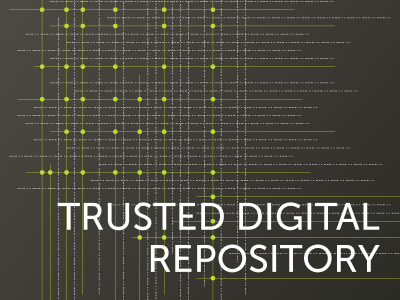
UNT Libraries' TRAC Conformance Document Released
The UNT Libraries’ Digital Collections have completed a self-audit of their digital repository policies, documentation, and infrastructure in accordance with the Trustworthy Repositories Audit & Certification: Criteria and Checklist (TRAC). The UNT Libraries are proud to announce that the UNT Libraries’ Digital Collections have completed a self-audit of their digital repository policies, documentation, and infrastructure in accordance with the Trustworthy Repositories Audit & Certification: Criteria and Checklist (TRAC). The goal of this audit was to formalize processes and create documentation necessary for the operation of a trusted digital repository. All documentation related to the process is available on the Digital Libraries Division’s Trusted Digital Repository web page. UNT Libraries: TRAC Conformance Document serves as an audit of the activities and methodologies behind the preservation of and access to content in the UNT Libraries’ Digital Collections. The audit examined two major infrastructure pieces: the Coda repository system, used for preservation services, and the Aubrey system, which provides public access to digital resources through The Portal to Texas History, the UNT Digital Library, and the Gateway to Oklahoma History. Download PDF The team involved with this audit included the following participants: Mark Phillips, Assistant Dean for Digital Libraries Hannah Tarver, Department Head, Digital Projects Unit Ana Krahmer, Head, Digital Newspaper Unit Daniel Alemneh, Head, Digital Curation Unit Laura Waugh, Repository Librarian for Scholarly Works In addition to those listed above, numerous individuals throughout the UNT Libraries contributed to the documentation effort. This self-audit was completed in partnership with the University of Florida George A. Smathers Libraries, whose team is moving toward completion of a similar audit process on University of Florida’s Digital Collections and its associated infrastructure. After completing their respective self-audits, these two institutions will create and perform a peer-review process for each other, with the end goal of developing a viable, replicable process that other institutions can use in their own peer-review audit processes. digital_libraries_in_the_news
Posted:
11/02/2015
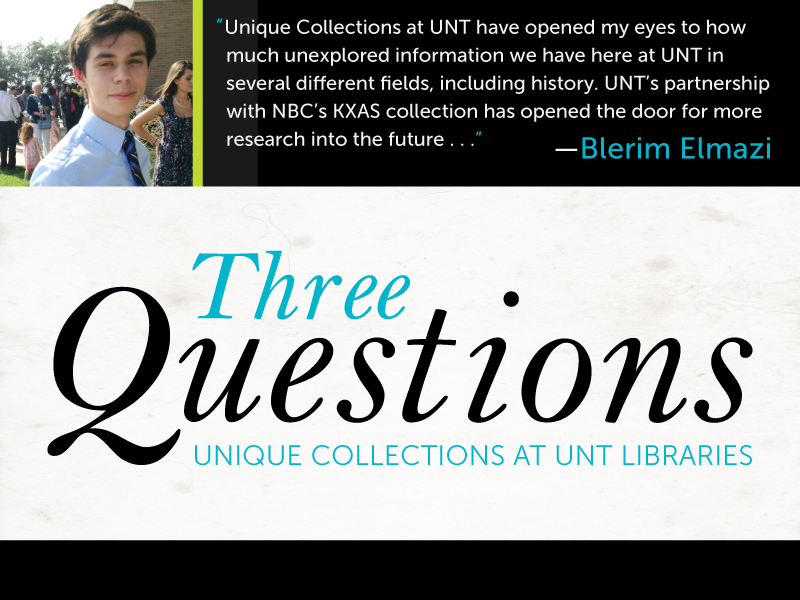
Three Questions with Blerim Elmazi, UNT Undergraduate Student
Blerim Elmazi is a senior at the University of North Texas double majoring in Political Science and History. He is a member of the UNT Honors College and is currently writing a thesis on third parties and campaign finance in American politics. After graduation he will attend law school in the fall semester. Three Questions is an initiative to share the value that our faculty, students, and others in the UNT community derive from using the Unique Collections at UNT Libraries. How important are Unique Collections in your teaching, learning or research? The UNT Special Collections provides an exciting experience for both beginning researchers and veterans in the research field. While researching the Mansfield desegregation crisis I, and several other students, were able to use oral histories, transcripts, video, and other media available in Special Collections. Most, if not all, of this collection had never been researched, making this a truly original research experience. Giving students the opportunity to research and explore these collections gives them a refreshing outlook on what education should be all about. How have Unique Collections changed the way you approach your research, teaching or learning? Unique Collections at UNT have opened my eyes to how much unexplored information we have here at UNT in several different fields, including history. UNT’s partnership with NBC’s KXAS collection has opened the door for more research into the future for students, professors, and researchers in general. I learned to better navigate through large collections, many of which contain thousands of pieces of information. Experience with this collection makes a student better understand how thorough and extensive historical research has to be. What do you want others to know about your research? My experience with the collection dealt with the Mansfield desegregation crisis that occurred in 1956. Besides utilizing the UNT Special Collections, I also was able to look through important memorandums, newspapers, and press releases of the incident at the Texas State Library and Archives in Austin, Texas. If anyone is interested to learn more about the Mansfield Crisis, or the history of desegregation in Texas in general, they should visit mansfieldcrisis.omeka.net. This project was a great collaborative effort and much of its success is due to our great mentors, Dr. Moye and Dr. Torget. Blerim Elmazi is a senior at the University of North Texas double majoring in Political Science and History. He is a member of the UNT Honors College and is currently writing a thesis on third parties and campaign finance in American politics. After graduation he will attend law school in the fall semester. external_relations_in_the_news_three_questions
Posted:
10/28/2015
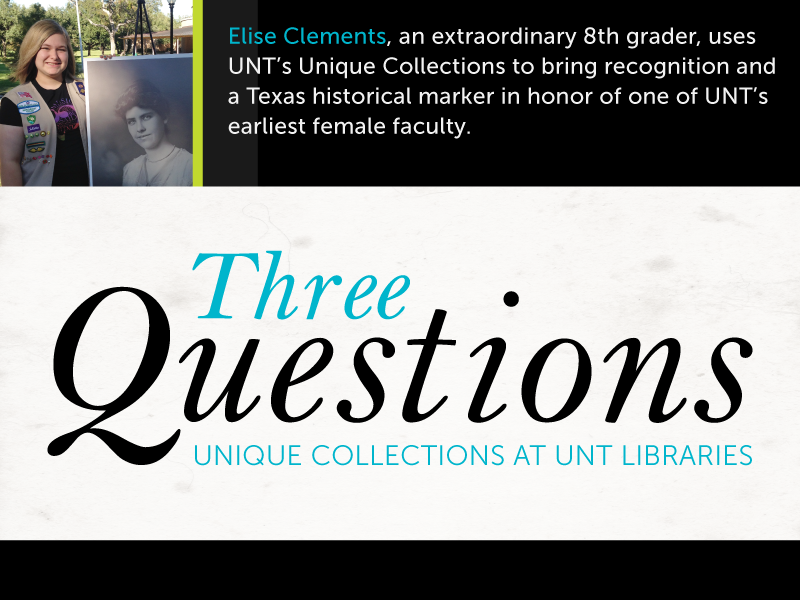
Three Questions with Elise Clements, 8th Grade Student
Elise Clements is an 8th grade student at Strickland Middle School. For her Girl Scout Silver Award, she wanted to have a historical marker made for Miss Beulah Ann Harriss. On October 24, 2014 she received notification that her narrative on Miss Harriss was selected to receive a Texas Historical Commission Undertold Story Marker. On October 25, 2015 a dedication ceremony will be held in the City of Denton Quakertown Park. Three Questions is an initiative to share the value that our faculty, students, and others in the UNT community derive from using the Unique Collections at UNT Libraries. How important are Unique Collections in your teaching, learning or research? When I started my project two years ago, which was to have a Texas Historical Commission historical marker made for Miss Beulah Harriss, I had no idea where to start. Through the UNT Digital Library and the Portal to Texas History, I was able to tell her life’s history from the time she came into Texas in 1914, to become the first physical education teacher at the North Texas State Normal College to her death in 1977. Through the early Yucca Yearbooks of North Texas State Normal School I was able to discover the history of how she started the first Girl Scout Troop in Denton in 1917 at the college and actually see pictures of some of the early troops. There were pieces of her early years in Girl Scouts that had not been documented. With the help of these online resources I was able to fill in those missing pieces. How have Unique Collections changed the way you approach your research, teaching or learning? I’ve learned to never be afraid to ask questions. When we contacted the UNT Archives to see if they had any information on Miss Harriss, I discovered they had some of her collection of Green Jackets and P.E. Bloomers. I was able to actually hold a piece of her history, which brought her story to life for me. I recently discovered that the archives also had her scrapbook and they placed it in the UNT: The First 50 Years Exhibit. I was able to view the exhibit online. What do you want others to know about your research? Never let people discourage you to do a project because they think you are too young. No one thought I could complete my project. The information was there for me, all of it was indexed, thanks to the UNT Digital Library and the Portal to Texas History. All I had to do was collect it, put it in order, and document it. Not only was I able to have a Texas Historical Commission Marker made for Miss Harriss, but UNT realized the many contributions she had made to the college. They are also having a marker made for her that will document the Harriss Gymnasium, which was named after her. Elise Clements is an 8th grade student at Strickland Middle School. For her Girl Scout Silver Award, she wanted to have a historical marker made for Miss Beulah Ann Harriss. She began her research in the fall of 2013 at the age of 12. On October 24, 2014 she received notification that her narrative on Miss Harriss was selected to receive a Texas Historical Commission Undertold Story Marker. On October 25, 2015 a dedication ceremony will be held in the City of Denton Quakertown Park. The Beulah A. Harriss marker will be placed near the location where the Girl Scout Little House once stood. external_relations_in_the_news_three_questions
Posted:
10/21/2015

Write Like An Expert: Featured Books At Discovery Park Library
Write like an expert using featured books on scientific writing styles, dissertation methodology, grammar basics, different styles of writing for different purposes (reports versus journal articles) and much more. Drop by B112 in Discovery Park to see the selection. discovery_park_collection_highlight
Posted:
10/16/2015
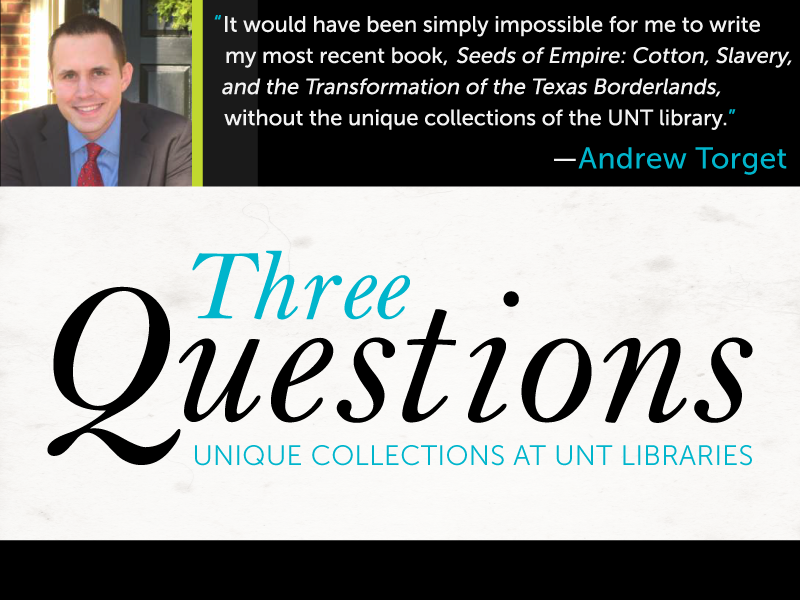
Three Questions with Dr. Andrew Torget, UNT Historian and Pioneer in Digital Scholarship
Andrew J. Torget is a historian of nineteenth-century North America I the UNT history department. A veteran of pioneering work in digital scholarship, he has been a featured speaker at Harvard, Stanford, Rice, Duke, Johns Hopkins, and the Library of Congress. Three Questions is an initiative to share the value that our faculty, students, and others in the UNT community derive from using the Unique Collections at UNT Libraries. How important are Unique Collections in your teaching, learning or research? The holdings of the UNT Libraries, particularly their digital archives, are absolutely central to my work. It would have been simply impossible for me to write my most recent book, Seeds of Empire: Cotton, Slavery, and the Transformation of the Texas Borderlands, without the unique collections of the UNT library. The massive digital newspapers collection, the cataloging and accessibility of almost-impossible-to-find archival resources like Stephen F. Austin’s unpublished letters, makes all the difference for a historian such as myself. I have made discoveries in these records that change how I understand and write about the past. In terms of my teaching, these collections have allowed me to build new research-focused courses for my students. In the spring of 2013, for example, I taught a graduate course focused on runaway slave ads in the Library’s digital newspaper collection. This past spring, I co-taught a course on the civil rights era in Texas, which relied heavily on the massive KXAS TV News archive that our Library acquired from NBC5. Relying on that amazing resource – and the tremendous work of the Library staff to make it accessible – a group of UNT undergraduate and graduate students were able to build a terrific online museum focused on the fight over civil rights in Texas during the 1950s. How have Unique Collections changed the way you approach your research, teaching or learning? It has enabled me to do research and teaching projects that would have otherwise been impossible. Three years ago, for example, I launched a new digital humanities project geared to take advantage of the tremendous wealth of the Library’s digital newspaper collection. Mapping Texts is an effort to combine text-mining and data visualization in order to detect meaningful language patters scattered across millions of words in the digitized Texas newspapers – to see, in other words, if we could find large-scale patterns in this massive archive that have long eluded scholars. This project was also sponsored by the National Endowment for the Humanities and has gone on to garner a great deal of national attention. What do you want others to know about your research? My research and teaching are a deep blend of new digital research methods and traditional historical archival work, both of which depend so heavily on the unique collections made available by the UNT library. Quite simply, I could do none of it without these amazing collections. Andrew J. Torget is a historian of nineteenth-century North America I the UNT history department. A veteran of pioneering work in digital scholarship, he has been a featured speaker at Harvard, Stanford, Rice, Duke, Johns Hopkins, and the Library of Congress. In 2011, he was named the inaugural David J. Weber Research Fellow at the Clements Center for Southwest Studies at Southern Methodist University. His most recent book is Seeds of Empire: Cotton, Slavery, and the Transformation of the Texas Borderlands, 1800-1850 (University of North Carolina Press, 2015). external_relations_in_the_news_three_questions
Posted:
10/13/2015
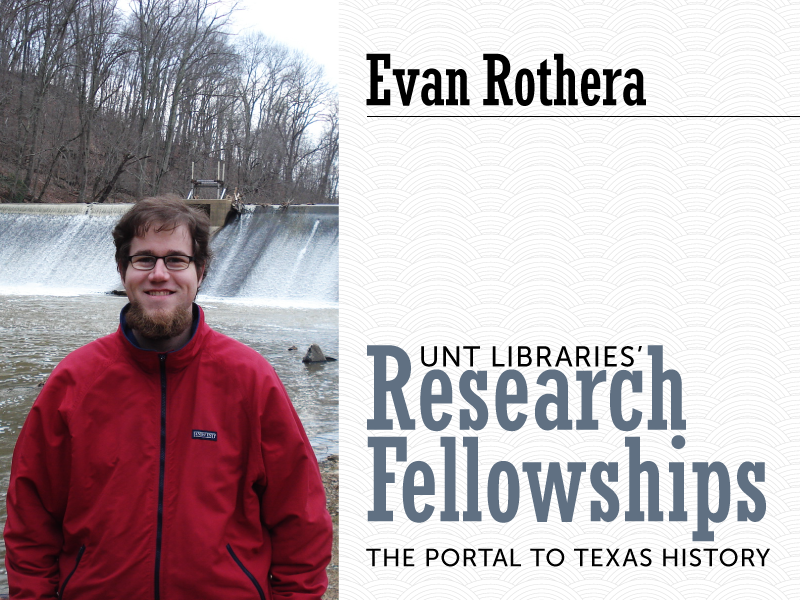
The Portal to Texas History 2015 Research Fellowship Awardee - Evan C. Rothera
Evan C. Rothera is a doctoral candidate in the History Department at The Pennsylvania State University. His project ‘There are in Texas men who have suffered much’: Reconstruction in the Lone Star State examines how Reconstruction unfolded, at the state and local levels, in Texas. The University of North Texas Libraries invite applications for the 2016 The Portal to Texas History Research Fellowship. Research using the Portal is relevant to studies in a variety of disciplines including history, journalism, political science, geography, and American studies. We encourage applicants to think creatively about the opportunities that research with large digital library collections can enable. Preference will be given to applicants who demonstrate the greatest potential for publication and the best use of The Portal to Texas History. The Portal to Texas History 2015 Research Fellowship Awardee Evan C. Rothera Project Title ‘There are in Texas men who have suffered much’: Reconstruction in the Lone Star State Project Description In contrast to studies of Reconstruction that focus on national politics, my project, “‘There are in Texas men who have suffered much’: Reconstruction in the Lone Star State,” examines how Reconstruction unfolded, at the state and local levels, in Texas. This analysis allows me to make comparisons with reconstructions in Argentina and Mexico and consider broader questions such as: did the fact that the United States had a fully functioning two-party system have anything to do with differing attitudes toward violence in the three countries and what role did the Constitution of each country play in this process? This project will shed new light on Reconstruction in the United States as well as placing Reconstruction in comparative perspective with other reconstructions in the Western Hemisphere. Biography Evan C. Rothera is a doctoral candidate in the History Department at The Pennsylvania State University. His dissertation analyzes reconstructions in the United States, Mexico, and Argentina. He has presented his research at numerous conferences and received the Outstanding Paper by a Graduate Student Award from the Society of Civil War Historians for his paper “‘Our South American Cousin’: Domingo F. Sarmiento and the Case for Comparative Reconstructions.” He has published an article in The Journal of Mississippi History, as well as numerous book reviews. digital_libraries_in_the_news_research_fellowships
Posted:
10/09/2015
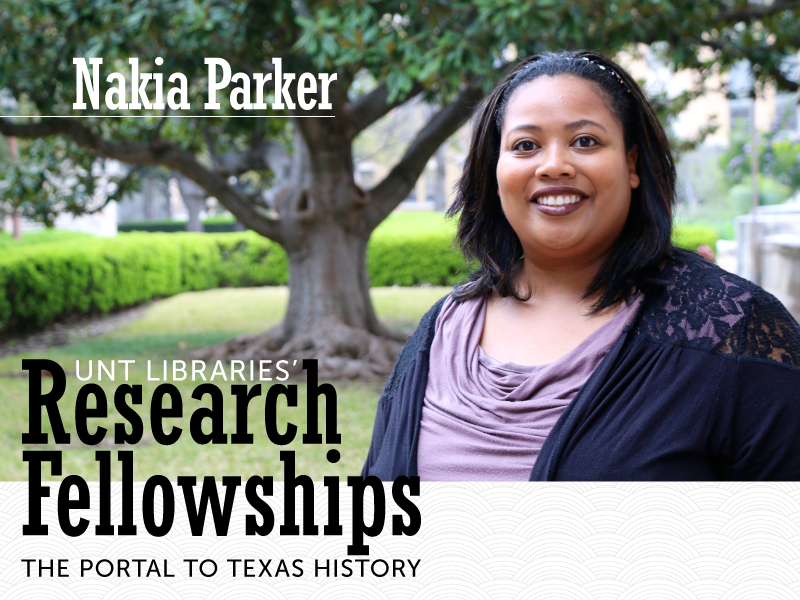
The Portal to Texas History 2015 Research Fellowship Awardee - Nakia Parker
Nakia Parker is completing her third year in the history doctoral program at the University of Texas. Her project Trails of Tears and Freedom: Slavery, Migration, and Emancipation in the Southwest Borderlands, 1830-1887 chronicles the lived experiences and migration patterns of enslaved people of African and Black Indian descent in Cherokee, Choctaw, and Chickasaw slaveholding communities in Arkansas, Indian Territory, and Texas between the time of Indian Removal to the passage of the Dawes Act of 1887. The University of North Texas Libraries invite applications for the 2016 The Portal to Texas History Research Fellowship. Research using the Portal is relevant to studies in a variety of disciplines including history, journalism, political science, geography, and American studies. We encourage applicants to think creatively about the opportunities that research with large digital library collections can enable. Preference will be given to applicants who demonstrate the greatest potential for publication and the best use of The Portal to Texas History. The Portal to Texas History 2015 Research Fellowship Awardee Nakia Parker Project Title Trails of Tears and Freedom: Slavery, Migration, and Emancipation in the Southwest Borderlands, 1830-1887 Project Description My proposed dissertation project “Trails of Tears and Freedom: Slavery, Migration, and Emancipation in the Southwest Borderlands 1830-1887” chronicles the lived experiences and migration patterns of enslaved people of African and Black Indian descent in Cherokee, Choctaw, and Chickasaw slaveholding communities in Arkansas, Indian Territory, and Texas between the time of Indian Removal to the passage of the Dawes Act of 1887. This locale was a volatile and contested space and home to a confluence of people and cultures. Through an examination of government and plantation records, newspaper accounts, and slave narratives, I argue that while enslaved people who lived in this area remained especially vulnerable to overt, spectacular acts of violence such as raids from the Comanche, this geographic space also offered diverse opportunities for bondpeople to engage in resistance, establish kinship ties with surrounding native polities, and attain freedom. Exploring enslaved life on this antebellum frontier—a space neither completely “southern” nor “western”— will demonstrate how these literal and figurative margins molded interactions and shaped the lives of the enslaved individuals who lived in this dynamic region. Biography Nakia Parker is completing her third year in the history doctoral program at the University of Texas in Austin under the direction of Dr. Daina Ramey Berry. Her research interests include Native American slaveholding and captivity practices in Texas, Oklahoma, and Arkansas during the nineteenth century, gender, antebellum Southern history, and memory studies. She completed her undergraduate degree in history at the State University of New York at New Paltz, where she graduated summa cum laude. Last year, she was elected the National Graduate Student Representative for the Association of Black Women Historians. In March 2015, she was awarded a C.M. Caldwell Memorial Award for Excellence in Historical Research by the Texas State Historical Association for her paper “Bold, Bad Notorious” Hal Geiger: Politics, Violence, and Defiance in Reconstruction Era East Texas.” digital_libraries_in_the_news_research_fellowships
Posted:
10/09/2015
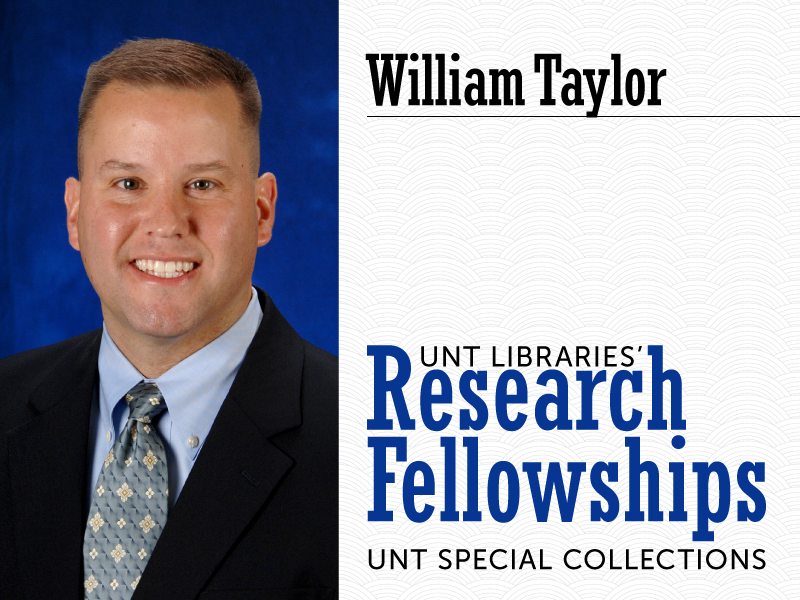
The UNT Special Collections 2015 Research Fellowship Awardee - William A. Taylor
William A. Taylor is Assistant Professor of Security Studies at Angelo State University. His project In the Service of Democracy: American Military Service from World War II to the Present will contribute to a chapter in a broader work on American military service from World War II to the present. The University of North Texas Libraries invite applications for the 2016 UNT Special Collections Research Fellowship. Research in special collections is relevant to studies in a variety of disciplines including history, journalism, political science, geography, fine art, art history and American studies. We encourage applicants to think creatively about new uses for special collections. Preference will be given to applicants who demonstrate the greatest potential for publication and the best use of special collections at UNT Libraries. The UNT Special Collections 2015 Research Fellowship Awardee William A. Taylor Project Title In the Service of Democracy: American Military Service from World War II to the Present Project Description The resulting research would contribute to a latter chapter in a broader work on American military service from World War II to the present. The book explores such issues in three ways. First, it examines the proper balance between national security and individual liberty within American democracy. Second, the book explores the place and role of military service within American society through the words and actions of various individuals and groups. Third, the book explores the relationship between citizenship and military service within American democracy. Biography Dr. William A. Taylor is Assistant Professor of Security Studies at Angelo State University in San Angelo, Texas. Taylor won grants from the Society for Military History, Harry S. Truman Library Institute, and Angelo State University Faculty Research Enhancement Program, and a George C. Marshall/Baruch fellowship to research Every Citizen a Soldier: The Campaign for Universal Military Training after World War II (Texas A&M University Press, 2014). Taylor maintains research interests in military service, military history, civil-military relations, security studies, grand strategy, and defense policy. Taylor has also contributed to nine other books and has published more than 40 reference articles and book reviews. His work has appeared in Journal of American History, Choice, Joint Force Quarterly, Journal of Military History, US Naval Institute Proceedings, On Point: The Journal of Army History, Maryland Historical Magazine, Human Rights Review, Michigan War Studies Review, Journal of America’s Military Past, US Military History Review, African Studies Quarterly, and H-Net Reviews, among others. special_collections_in_the_news_research_fellowships
Posted:
10/09/2015
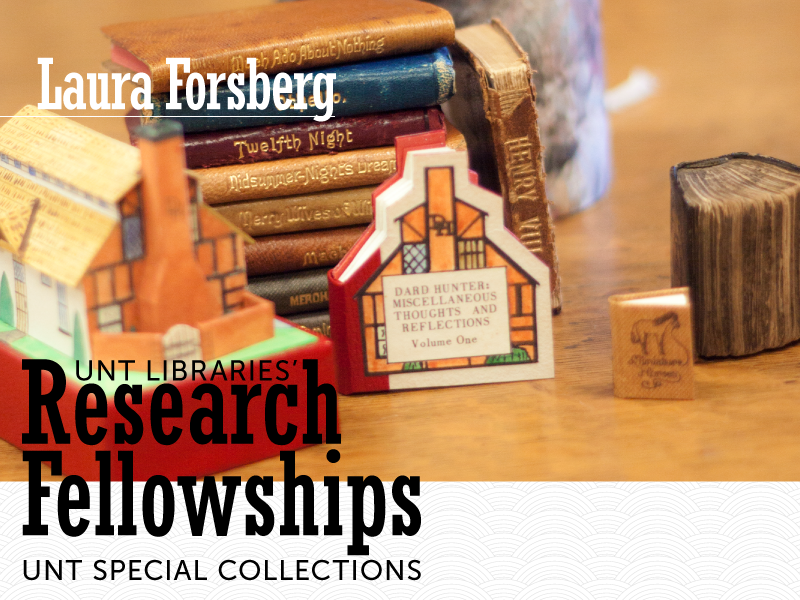
The UNT Special Collections 2015 Research Fellowship Awardee - Laura Forsberg
Laura Forsberg is a sixth-year Ph.D. candidate in English at Harvard University. Her project The Victorian Miniature Book shows how the miniature book re-enchants familiar works and transports the reader from the dull world of full-sized reality into an expansive realm of minute possibility. The University of North Texas Libraries invite applications for the 2016 UNT Special Collections Research Fellowship. Research in special collections is relevant to studies in a variety of disciplines including history, journalism, political science, geography, fine art, art history and American studies. We encourage applicants to think creatively about new uses for special collections. Preference will be given to applicants who demonstrate the greatest potential for publication and the best use of special collections at UNT Libraries. The UNT Special Collections 2015 Research Fellowship Awardee Laura Forsberg Project Title The Victorian Miniature Book Project Description During the nineteenth-century, publishers began to produce a profusion of miniature books, including thumb bibles, alphabets, almanacs, fairy tales and books of history. Despite their minute proportions (miniature books typically measure less than three inches in size), these volumes functioned in the Victorian period as imaginative tokens of expansive knowledge. Using the extensive collection of miniature books and related archival materials in the University of North Texas Special Collections, I show how the miniature book re-enchants familiar works and transports the reader from the dull world of full-sized reality into an expansive realm of minute possibility. Biography Laura Forsberg is a sixth-year Ph.D. candidate in English at Harvard University. Her dissertation on “The Miniature and Victorian Literature” seeks to restore size as a major category of the imagination in the Victorian age by examining miniature paintings, dolls, fairies, microscopes and miniature books in the literature and culture of the period. While Ms. Forsberg’s primary interest is in the Victorian novel, she also studies and teaches children’s literature, book history, poetry and medievalism. She has articles being published this year in both Victorian Studies and SEL: Studies in English Literature 1600-1900. She currently lives in Austin, Texas and works as an adjunct faculty member at Concordia University. special_collections_in_the_news_research_fellowships
Posted:
10/09/2015
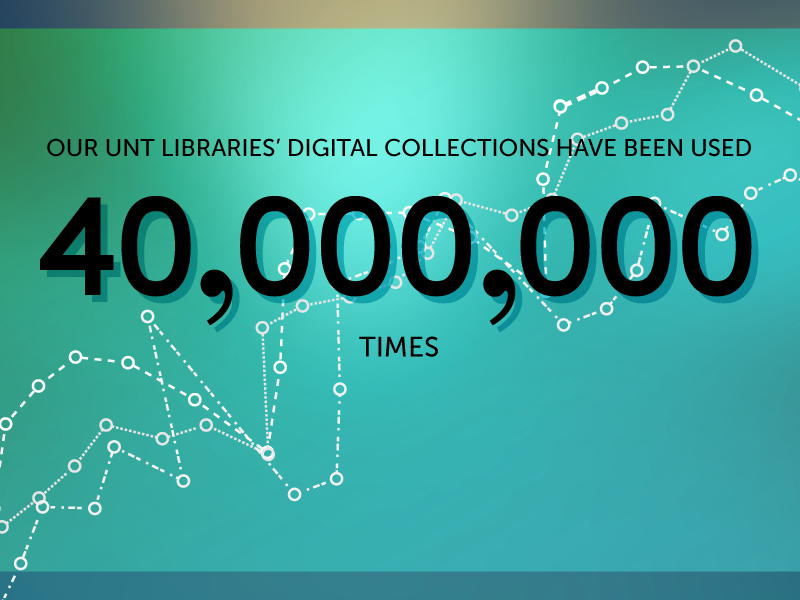
40 Million Uses and Counting
The UNT Libraries’ Digital Collections (The Portal to Texas History, the UNT Digital Library, and the Gateway to Oklahoma History) recently recorded a milestone of 40 million uses. Part of the Libraries’ unique collections, these resources give UNT faculty, staff, and students unprecedented access to some 1.2 million items and 18 million pages of content. The UNT Libraries’ Digital Collections (The Portal to Texas History, the UNT Digital Library, and the Gateway to Oklahoma History) recently recorded a milestone of 40 million uses. Part of the Libraries’ unique collections, these resources give UNT faculty, staff, and students unprecedented access to some 1.2 million items and 18 million pages of content. These growing collections also reach researchers and lifelong learners around the world, 24/7. The Portal to Texas History presents cultural heritage materials contributed by institutions, associations, and individuals across Texas. It also contains more than 3 million pages of historic Texas newspapers dating from 1829 to the present. The UNT Digital Library is home to materials from the University’s research, creative, and scholarly activities, and also showcases content from UNT department and library holdings. The Gateway to Oklahoma History is a service of the Oklahoma Historical Society. It provides access to historic Oklahoma newspapers and photographs. Each site allows you to browse, search, and filter content. You can also search the three sites simultaneously from the Libraries’ Web page. In these sites all interactions a user makes with any part of a digital item within a thirty minute window are grouped as one “use.” At the end of the day these uses are combined for each item to create the item’s total uses for the day. Ultimately we aggregate the item uses by collection, partner, and system level uses and make the data available on “statistics” pages throughout the three sites. digital_libraries_collection_highlight
Posted:
10/08/2015
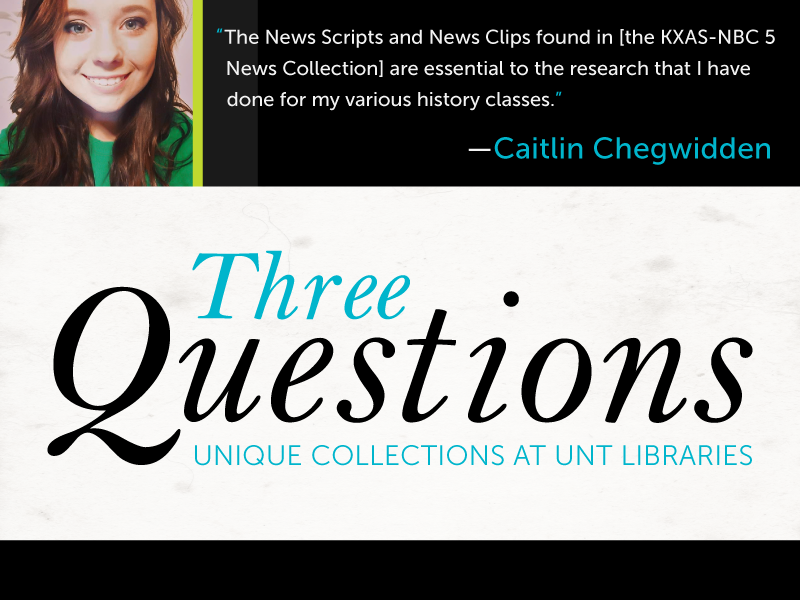
Three Questions with Caitlin Chegwidden, UNT Undergraduate Student
Caitlin Chegwidden is a junior at the University of North Texas majoring in History with a minor in Psychology. She is involved with the center for Leadership and Service on campus and is a member of Delta Gamma Fraternity. She is also the Director of Archives for her chapter. Three Questions is an initiative to share the value that our faculty, students, and others in the UNT community derive from using the Unique Collections at UNT Libraries. How important are Unique Collections in your teaching, learning or research? As a student here at UNT I have found that the special collections are essential to my learning and research. I first began to utilize our unique collections while writing research papers for my upper level history courses, specifically the Portal to Texas History. The amount of resources that can be found within this collection is astonishing and I have only begun to tap into them. In the spring of 2015 I was able to enroll in a history course that exclusively dealt with the civil rights movement in Texas. This course was taught as a direct response to the newly acquired KXAS-NBC 5 News Collection. The purpose of this class was to create an online museum analyzing the importance of the crisis at Mansfield High School. During this course I spent a considerable amount of time doing research over the KXAS-NBC 5 News Collection and found that without this collection we would have missed out on a unique aspect of the crisis. In fact, because the information found in the KXAS-NBC 5 News Collection was so abundant we decided to create an entirely new exhibit just with resources from this collection. As a researcher the information that can be found within our collections at UNT is vital to the understanding of our history. The research that I have done with special collections has allowed me to grow a greater passion for my field of study. I am proud to attend a university that supplies these truly unique collections. How have Unique Collections changed the way you approach your research, teaching or learning? Our collections here at UNT have changed the way I approach my research because of the ease at which I can access the information. Being able to access these collections so easily allows me to research more because I’m not spending time tracking down these archives at various locations. UNT is in the process of digitizing the KXAS-NBC 5 News Collection. The News Scripts and News Clips found in this archive are essential to the research that I have done for my various history classes. These collections have made my research significantly easier. What do you want others to know about your research? The research that I have done so far in my college career would not have been possible without the UNT special and digital collections, specifically the KXAS-NBC 5 News Collection and The Portal to Texas History. The news coverage found in the KXAS archive is essential to understanding the crisis at Mansfield High because these are the stories that the everyday citizens of Texas were exposed to. Even though only a small portion of these news clips have been digitized this collection offers us a unique account of the events that took place at Mansfield high school. Caitlin Chegwidden is a junior at the University of North Texas majoring in History with a minor in Psychology. She is involved with the center for Leadership and Service on campus and is a member of Delta Gamma Fraternity. She is also the Director of Archives for her chapter. external_relations_in_the_news_three_questions
Posted:
10/07/2015
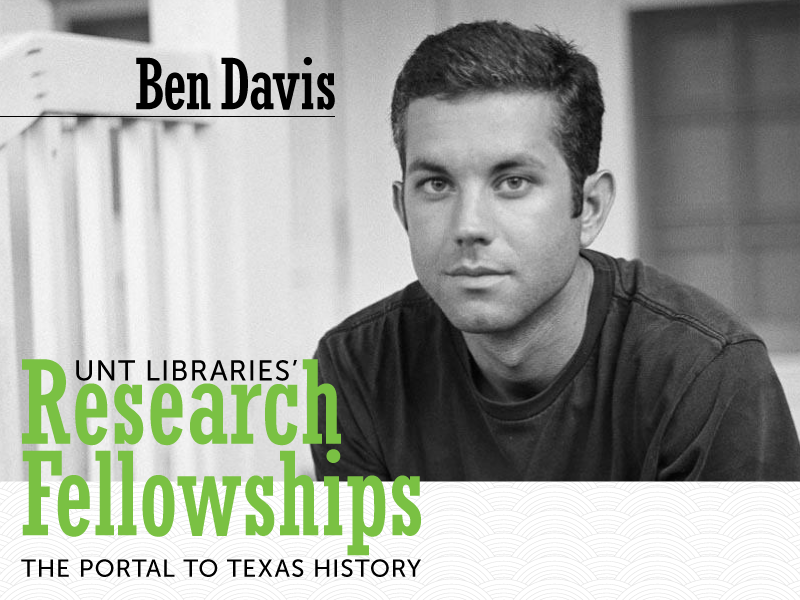
The Portal to Texas History 2015 Research Fellowship Awardee - Ben Davis
Ben Davis holds an MFA in photography and is currently working toward his MS-LS in Archival Studies and Imaging Technology at UNT. His project Historic Architecture of Harrison County Texas investigates the social experience of architecture by documenting cultural rituals and events that took place at historic structures in Texas over 150 years ago. The University of North Texas Libraries invite applications for the 2016 The Portal to Texas History Research Fellowship. Research using the Portal is relevant to studies in a variety of disciplines including history, journalism, political science, geography, and American studies. We encourage applicants to think creatively about the opportunities that research with large digital library collections can enable. Preference will be given to applicants who demonstrate the greatest potential for publication and the best use of The Portal to Texas History. The Portal to Texas History 2015 Research Fellowship Awardee Ben Davis Project Title Historic Architecture of Harrison County Texas Project Description Historic Architecture of Harrison County Texas, investigates the social experience of architecture by documenting cultural rituals and events that took place at historic structures in Texas over 150 years ago. The culmination of the project will manifest in two formats, an online architectural resource and exhibit of photographs in Harrison County, Texas. Biography Ben Davis was born in Houston Texas in 1981. In 2007 he moved to Kerrville Texas to attend Schreiner University where he received a B.A. in Creative Arts. Davis currently lives in Denton Texas where he graduated from the University of North Texas with an MFA in photography in May of 2014, and is currently working toward an MSLS in Archival Studies and Imaging Technology. Davis makes frequent excursions to East Texas to document the region’s remaining vernacular buildings and to maintain relationships with friends and family. digital_libraries_in_the_news_research_fellowships
Posted:
10/06/2015
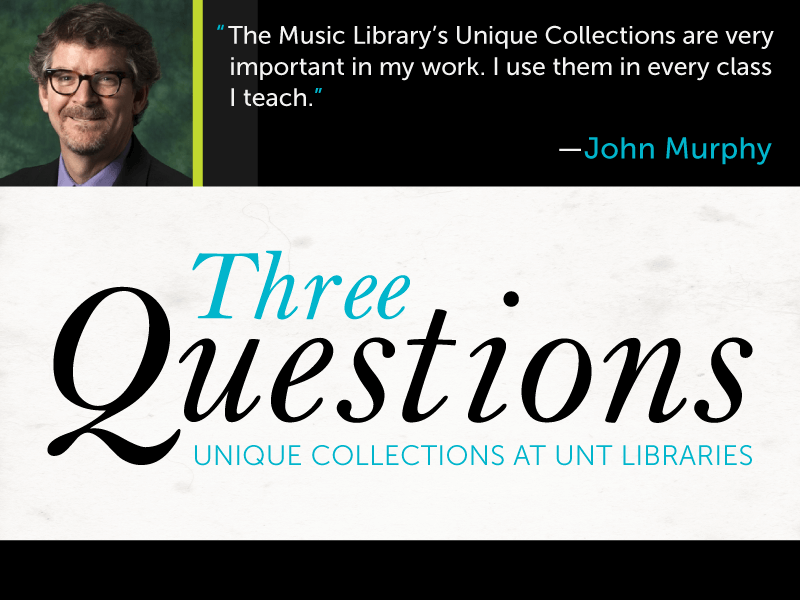
Three Questions with John Murphy, Professor of Jazz History
< John Murphy attended UNT from 1981-1986. He joined the UNT Jazz Studies faculty in 2001, and began serving as chair in 2008. Using the UNT Libraries is one of his favorite things to do. Three Questions is an initiative to share the value that our faculty, students, and others in the UNT community derive from using the Unique Collections at UNT Libraries. How important are Unique Collections in your teaching, learning or research? The Music Library’s Unique Collections are very important in my work. I use them in every class I teach: jazz history for undergraduates and graduate students and jazz analysis and research methods for graduate students. How have Unique Collections changed the way you approach your research, teaching or learning? Because we have the unique collections, we can go into more depth and do more with primary sources. For example, I assign my students to use the unique collections to work directly with scores of songs and stock arrangements. When we listen to Lester Young’s solo on “Shoe Shine Boy” we can learn more about that tune by examining the stock arrangement and the original sheet music. When we read music theorist Allen Forte’s analysis of the song “Alone Together”, which uses the composer’s piano harmonization, we can see that it in the original sheet music. What do you want others to know about your research? One point I try to make with every class as students begin research projects in the UNT library is that the library is more than books, CDs, and journals, more than citation formats: it represents the accumulated work of many people, including people in our community like the late Bob Rogers, whose years of volunteer work enable us to search the WFAA and WBAP collections and to search the collections of jazz songbooks by tune title. Students have the contents of donated collections of recordings to use because former Music Library Head Morris Martin drove the van to pick up these Unique Collections from donors. The music librarians he mentored carry on this work. Librarians do the essential work of preserving and organizing our cultural knowledge. Without them learning at a university would not be possible. Regarding my own research: two library items represent my contributions to the scholarly conversation about Brazilian music: Music in Brazil: experiencing music, expressing culture and Cavalo-marinho pernambucano. John Murphy attended UNT from 1981-1986, did a bunch of stuff you can read about here. He joined the UNT Jazz Studies faculty in 2001, and began serving as chair in 2008. Using the UNT library is one of his favorite things to do. external_relations_in_the_news_three_questions
Posted:
09/29/2015
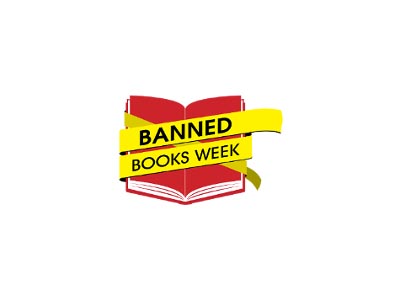
Banned Books Week Programming
Banned Books Week is September 27-October 3, 2015! UNT Libraries are recognizing Banned Books Week with several programs for the campus and community. September 27-October 3, 2015: Censored for Centuries: Banned and Censored LGBT+ Literature Throughout History. This display highlights books that have been banned and censored for homosexual themes and content, works from LGBT authors, and resources related to the culture and history Lesbian, Gay, Bisexual and Transgender individuals. September 28 - December 18, 2015: [Forum Exhibit on Censorship][]. This exhibit explores materials in the University of North Texas Libraries’ unique collections that have been threatened by censorship. (Willis Library Forum, Room 140) September 29, 2015, 9 a.m. - 2 p.m.: [Banned Books Readout][]. Sigma Tau Delta, the International English Honor Society with UNT Libraries present the annual reading of banned and challenged books. (Library Mall by the Fountain) Voter registration will be available. September 29, 2015, 1-2:30 p.m.: Banned & Challenged Books. Emeritus College class on book censorship with Susan Smith and Spencer Keralis (UNT Libraries) (registration required). (Robson Ranch) October 13, 2015, 6-8 p.m.: [UNT Speaks Out on Censorship][] with Nora Gilbert (UNT English), Susan Smith (UNT Libraries), and parents and students from HP Kids Read, a community organization combating censorship in Highland Park ISD. (UNT on the Square Gallery) Voter registration will be available. Celebrate banned and challenged books by attending these events and visiting the exhibit and displays in the Library. The UNT Libraries support the general principles set forth in the Library Bill of Rights. public_services_in_the_news
Posted:
09/27/2015
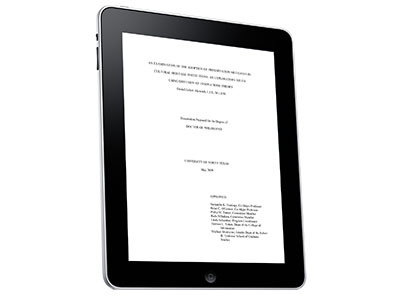
New System Enhances Electronic Theses and Dissertations (ETDs) Submission and Management
The Toulouse Graduate School and the UNT Libraries are pleased to announce the implementation of Vireo, an online thesis/dissertation tool which will enable graduate students to turn in all required materials online. This fall changes are coming to the way UNT’s graduate degree candidates submit their completed theses and dissertations. The Toulouse Graduate School (TGS) and the UNT Libraries are pleased to announce the implementation of Vireo, an online thesis/dissertation submission tool which will enable graduate students to turn in all required materials online—from anywhere—doing away with the need for hard copy delivery. According to Daniel Alemneh, UNT Libraries Digital Curation Coordinator, Vireo will make the ETD submission process fully electronic by providing a simple and intuitive online interface. That means the workflow involved in ETDs lifecycle management—ranging from submission by students to approval by the respective departments and graduate office to publication in UNT’s digital repository and ProQuest—will be more efficient. What’s more, “all stakeholders will be able to see the status of a particular thesis or dissertation simultaneously. It’s really seamless.” Vireo implementation is scheduled to occur in two phases, coinciding with fall 2015 and spring 2016 graduation. Students from the following colleges who are planning to graduate fall 2015 will use Vireo for their submissions, beginning October 1, 2015: College of Business College of Information College of Merchandising, Hospitality and Tourism College of Public Affairs and Community Service College of Visual Arts and Design Mayborn School of Journalism Toulouse Graduate School (for interdisciplinary masters students) The submission deadline for fall graduation is October 23, 2015; Vireo will remain available after this date to students in these colleges who are eligible for the rollover deadline of December 3 (May 2016 graduation). Beginning March 1, 2016, students from all colleges (CAS, COE, CoEng, and CoM, plus the initial 7) planning to graduate in May 2016 will use Vireo to submit materials. [NOTE: Students who already submitted by rollover deadline are excluded; Vireo prevents students from submitting twice.] Vireo is an open-source software application created by Texas A&M University and the Texas Digital Library (TDL), and is specifically designed to be very user-friendly. Guidance documents are available on the Toulouse Graduate School’s website; in addition, the Texas Digital Library will handle any technical issues students or faculty may experience. You can find TDL’s student help videos at http://vireoetd.org/vireo/support/vireo-3-0-help-videos/. After submission, the review/approval process will continue to be handled by the graduate school. Final copies will be placed in the Libraries’ online repository where they can be readily accessed by scholars from around the world. Special thanks to Jill Kleister, Graduate Reader, UNT Toulouse Graduate School, and Dr. Daniel Alemneh, Digital Curation Coordinator, UNT Libraries digital_libraries_in_the_news
Posted:
09/18/2015
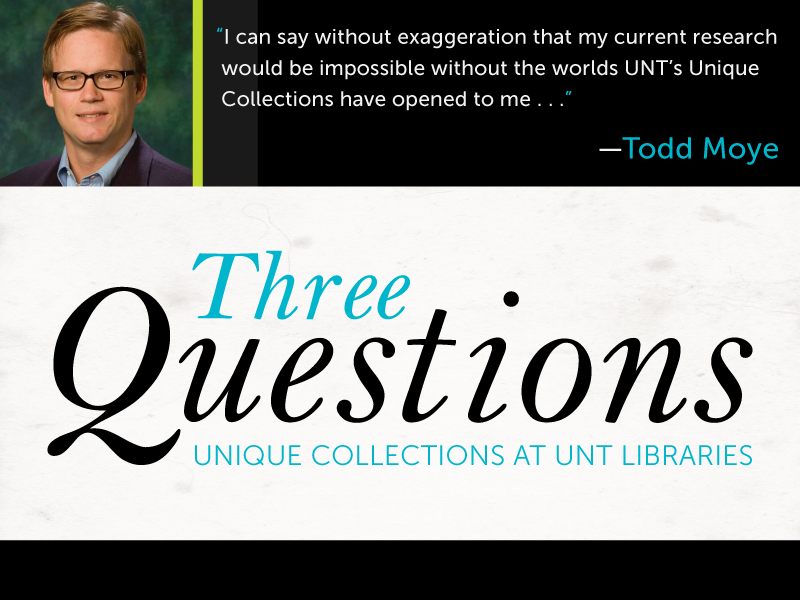
Three Questions with Todd Moye, UNT Professor of History
Todd Moye is a Professor of History at UNT and the Director of the UNT Oral History Program. Three Questions is an initiative to share the value that our faculty, students, and others in the UNT community derive from using the Unique Collections at UNT Libraries. How important are Unique Collections in your teaching, learning or research? I can say without exaggeration that my current research would be impossible without the worlds UNT’s Unique Collections have opened to me, and my teaching would be much poorer. I was not trained as a Texas historian, but last year, after writing three books on the history of civil rights movements outside of Texas, I jumped into Lone Star State history with both feet. The Portal to Texas History and other resources within Unique Collections have enabled me to come up to speed much, much faster than I would have been able to otherwise by opening a treasure trove of other scholars’ research and primary sources that have yet to be exploited. How have Unique Collections changed the way you approach your research, teaching or learning? I was lucky enough to co-teach a course on the Civil Rights Movement in Texas with my colleague Dr. Andrew Torget in the Spring 2015 semester. We built the entire course around undergraduates’ original research in UNT’s KXAS Collection, the Portal to Texas History, and other materials in UNT Special Collections and other archives. It was the most rewarding experience I have ever had as an educator, and I’m positive that our students consider it the best and most important class they will ever take at UNT. It would be impossible to design all of my undergraduate courses around original research, but I have managed to use some aspect of Unique Collections—interviews from the UNT Oral History Collection, newspaper articles from the Portal to Texas History, etc.—in some way in nearly every class I have taught in the UNT History Department since 2005. Making primary sources available to students and helping them work through the contradictions and new possibilities they find there gets to the very heart of liberal arts education. I can’t imagine how I would be able to accomplish this—I certainly couldn’t accomplish it on a large scale—without having such easy access to these collections. What do you want others to know about your research? I’d like to show off the product of my students’ research from the Civil Rights Movement in Texas class, an online museum of the Mansfield Crisis: http://mansfieldcrisis.omeka.net/. I could not be prouder of it! Todd Moye is a Professor of History at UNT and the Director of the UNT Oral History Program. external_relations_in_the_news_three_questions
Posted:
09/17/2015
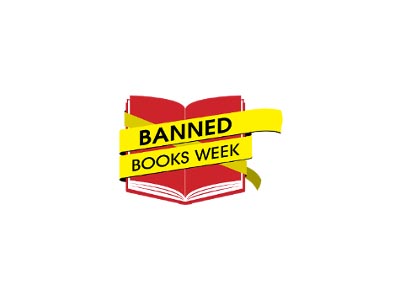
UNT Libraries partners with Sigma Tau Delta for the Banned Books Readout
The University of North Texas Libraries joins Sigma Tau Delta, the International English Honor Society, to present the Banned Books Readout! UNT students, faculty, and staff, and the Denton community are invited to join us to read from your favorite banned or challenged book. Sign up here to read! Young Adult books are the focus of the 2015 Banned Books Week, the annual celebration of the freedom to read. “Young Adult books are challenged more frequently than any other type of book,” said Judith Platt, chair of the American Library Association Banned Books Week National Committee. “These are the books that speak most immediately to young people, dealing with many of the difficult issues that arise in their own lives, or in the lives of their friends. These are the books that give young readers the ability to safely explore the sometimes scary real world. This Banned Books Week is a call to action, to remind everyone that young people need to be allowed the freedom to read widely, to read books that are relevant for them, and to be able to make their own reading choices.” Banned Books Week is the national book community’s annual celebration of the freedom to read. Hundreds of libraries and bookstores around the country draw attention to the problem of censorship by mounting displays of challenged books and hosting a variety of events. The 2015 celebration will be held September 27-October 3. Banned Books Week was launched in 1982 in response to a sudden surge in the number of challenges to books in schools, bookstores and libraries. More than 11,300 books have been challenged since 1982 according to the American Library Association. There were 311 challenges reported to the Office of Intellectual Freedom in 2014, and many more go unreported. The readout will take place Tuesday, September 29, 2015, 9 a.m. to 2 p.m. on the Library Mall behind the book sculpture near Jody’s Fountain. Voter registration will be available at the event! The Banned Books Readout is free and open to the public. For information on visiting the UNT campus, please go to Parking and Transportation Services. For additional information on Sigma Tau Delta, visit their webpage. public_services_in_the_news
Posted:
09/09/2015
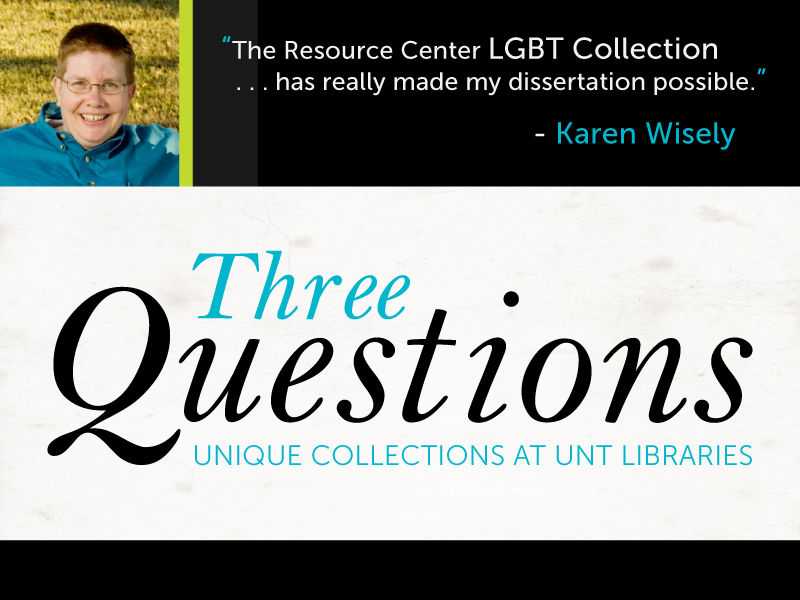
Three Questions with Karen Wisely, UNT Doctoral Student
Karen Wisely is a Ph.D. candidate from the History Department of the University of North Texas whose dissertation topic is the formation of LGBT community in Dallas. She discusses the importance of the Unique Collections at UNT Libraries to her research. Three Questions is an initiative to share the value that our faculty, students, and others in the UNT community derive from using the Unique Collections at UNT Libraries. How important are Unique Collections in your teaching, learning or research? I am in the midst of writing a dissertation on the development of the Dallas gay community to complete requirements for a doctorate in history. The Resource Center LGBT Collection of the UNT Libraries is vital to my research. There are over 600 boxes in the collection, covering virtually every organized activity of the Dallas community from 1940 to the present. This collection and the cataloguing of it in such quick order have really made my dissertation possible. How have Unique Collections changed the way you approach your research, teaching or learning? Prior to the collection being obtained by the UNT Libraries, it resided in various storage facilities in Dallas. The boxes were stacked on top of each other, the labeling was sporadic, and access was severely limited. Now, thanks to the work of the UNT Archives staff, I can sit at home in front of my computer, browse through the detailed finding aid, email the staff which box I need to look at, and it will be waiting for me the next time I visit the library. This convenience has allowed me to be much more focused in what I’m researching. What do you want others to know about your research? The Dallas-Fort Worth Metroplex is one of the top ten largest urban areas in the country and home to one of the most vibrant and active LGBT communities in the United States, and even the world. Yet, because of the difficulties in accessing this collection prior to UNT obtaining it, no one has written anything about its history. It was a stroke of luck that, just as I was ready to dive in and do heavy-duty research, this collection moved to UNT where the wonderful staff had it organized and ready for use in less than a year. If it had been this easy to use before, I would probably be researching a different topic. Karen Wisely is a Ph.D. candidate from the History Department of the University of North Texas whose dissertation topic is the formation of LGBT community in Dallas. This work follows up on her Master’s thesis on the same topic. She is a three-time recipient of the C.M. Caldwell Memorial Award, sponsored by the Texas State Historical Association, which recognizes excellence in historical research and writing on Texas or local history topics. She has presented papers at the Oral History Association’s annual meeting and, most recently, at the East Texas Historical Association’s meeting. Currently, she is a teaching fellow with the History Department where she has taught numerous sections of the American History survey. external_relations_in_the_news_three_questions
Posted:
09/08/2015
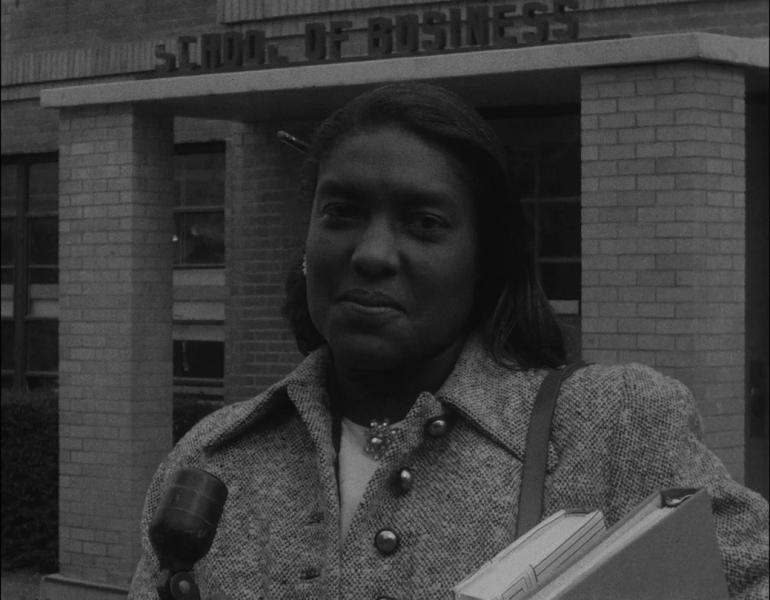
Irma E.L. Sephas: First African-American undergraduate student at the University of North Texas
Newly discovered film in the NBC 5/KXAS Television News Collection has revealed footage of Irma E.L. Sephas, the first African-American undergraduate student at the University of North Texas attending classes on February 9, 1956. Prior to the discovery of this footage there was no known image of Sephas or of this historic time on campus. University administration feared that Sephas would face riots or violence on campus similar to events unfolding at University of Alabama. However, as seen on this footage, her first days at UNT passed peacefully, with Sephus saying on film, “I am happy to be a student of the campus of good old North Texas that exemplifies the true Texas spirit, because certainly every hour I have spent here has been a pleasant one.” (Sound on film begins at 00:00:37.) The footage captured here belies the turmoil which at times surrounded desegregation at UNT. It is known from later interviews that times President J.C. Matthews dispatched crews to campus in the early morning hours to erase racial epithets which had been chalked on sidewalks and to extinguish a burning cross on the lawn of the Administrative Building. This footage was found within the NBC 5/KXAS Television News Collection which was donated to UNT Libraries in 2013. The archive contains historic broadcast footage, scripts, advertisements, still photography and research files dating from 1950 through 2012. Film and video in the archive remain in its original physical format, in this case 16mm film. UNT Special Collections staff worked with Laura Treat, Film and Media Preservation Librarian, to digitize this film in honor of the university’s 125 anniversary. View “Irma E.L. Sephas - First African American Undergrad at UNT” on YouTube View the original broadcast script for this footage Learn more about the NBC 5/KXAS Television News Collection special_collections_in_the_news
Posted:
08/27/2015
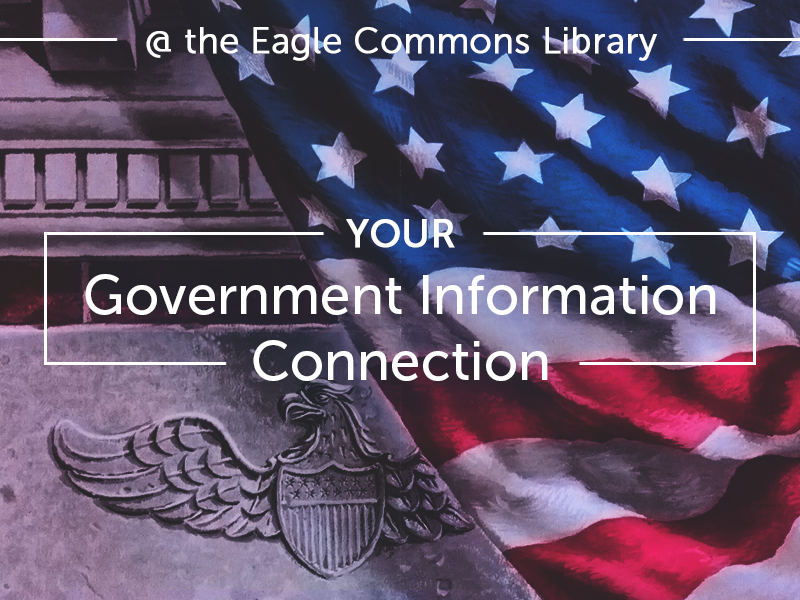
UNT's Collection of CRS Reports Surpasses 20,000
This month the University of North Texas reached 20,077 reports in its CRS Reports collection available through the UNT Digital Library. CRS, or Congressional Research Service, Reports are materials commissioned by Congress and produced by a division of the Library of Congress. CRS Reports are funded by tax dollars but are not readily available to the public. As noted in a recent New York Times Op-Ed, CRS Reports are “not classified. They’re nonpartisan. And unlike many government reports, they’re fairly easy to understand.” To ensure availability of these valuable resources, students and staff of UNT’s Government Information Connection work to find, preserve and provide access to CRS Reports through the UNT Digital Library. CRS Reports include short reports, long reports and issue briefs in topic areas of public policy, foreign relations, domestic affairs, and science and industry and are a free and valuable resource for undergraduate, graduate and faculty research. With reports dating from the mid-1970s, this collection offers historic and current looks at trends and issues in domestic and foreign policy. In the last five years, the UNT CRS Report collection has seen over 1 million uses. Here’s a rundown of the 5 most accessed reports. 1.The Labor Market during the Great Depression and the Current Recession, 2009 – total uses 13,025 2.9/11 Terrorism: Global Economic Costs, 2005 – total uses 10,251 3.Glass-Steagall Act: Commercial vs. Investment Banking, 1987 – total uses 7,032 4.Section 1206 of the National Defense Authorization Act for FY2006: A Fact Sheet on Department of Defense Authority to Train and Equip Foreign Military Forces, 2008 – total uses 6,776 5.Tax Reform Act of 1986: Public Law 99-514, 1986 – total uses 5,322 Calls are often issued to Congress to make these reports public. Until Congress acts to make CRS Reports easily accessible for public consumption, and even after, UNT will continue to collect and provide access to CRS Reports. libraries_collection_highlight
Posted:
08/17/2015
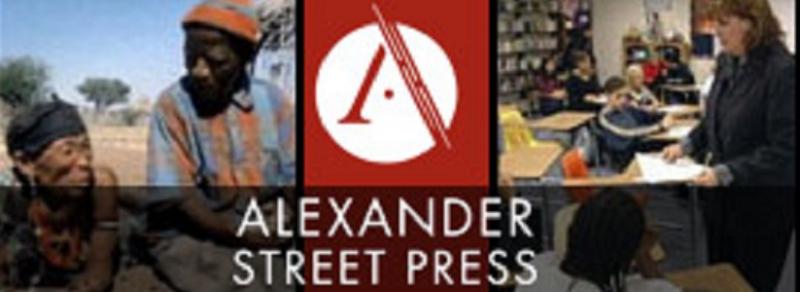
NEW! LGBT Thought & Culture
[LGBT Thought & Culture][] provides a unique look into LGBT life from the late 19th to the early 21st centuries. LGBT Thought and Culture is an online resource hosting the key works and archival documentation of LGBT political and social movements throughout the 20th century and into the present day. It provides a unique look into LGBT life from the late 19th to the early 21st centuries, creating research opportunities and providing course material for educators of cultural studies, history, women’s and gender studies, political science, sociology, and more. Included in this resource are the Pat Rocco Collection, the Magnus Hirschfeld Collection, a wide variety of LGBT magazines, newspapers and books, and much more. eresources
Posted:
08/12/2015
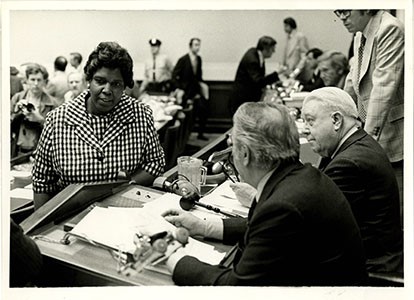
New Items Available in the Barbara C. Jordan Archives Digital Collection
New historic documents, photographs, and scrapbooks are now available in the Barbara C. Jordan Archives digital collection through the Portal to Texas History. “I never wanted to be run-of-the-mill.” –Barbara Jordan1 Jordan at Texas Senate. (Photo by uncredited photographer, 5” x 7”, black and white. ca. 1972. Courtesy of Texas Southern University Special Collections.) First African-American woman in the Texas Senate. First African-American woman elected to the Legislature since 1883. First African-American woman from the South to be elected to U.S. Congress. These are just a few of the accomplishments documented in the Barbara C. Jordan Archives collection now available in The Portal to Texas History. This collection was made available by the Texas Southern University Special Collections and the University of North Texas Libraries’ digital collections. Barbara Charline Jordan was born February 21, 1936 in Houston, Texas. She graduated from Texas Southern University with a degree in political science and later received her law degree from Boston University in She served her first term in the Texas Legislature in 1966, and in 1972, was elected to the United States House of Representatives where she served until 1979. Following her political career, Jordan joined the University of Texas at Austin as a professor and held the Lyndon B. Johnson Centennial Chair in National Policy. Known to be a “rigorous mentor and a dedicated professor,” Jordan accumulated many honors before her death in 1996 including thirty-three honorary doctorates and national awards, the Presidential Medal of Freedom, and the title “Role Model of the Century” in 1999 by Texas Monthly magazine.2 “Today we are not being petty, we are trying to be big because the task we have before us is a big one.”– From Jordan’s speech before the House Judiciary Committee, July 25, 1974. Providing access to documents depicting the extensive and rich career of this American stateswoman has been no small task. In addition to photographs, The Portal to Texas History now contains materials from Jordan’s time in the Texas Senate, many of her speeches, and scrapbooks compiled from 1967 to 1980. The documents provide a behind-the-scenes look at Jordan’s drafting process including handwritten, teleprompter, and typed copies of her speeches. The collection has provided access to such famous compositions as “Civil Liberties: Inoperative? Inaudible? Unintelligible? Expletive Deleted?,” the speech given at Howard University’s Commencement on May 11, 1974 as she prepared for the Judicial Committee Hearing on the Impeachment of Richard Nixon; a draft of the famous Judiciary Committee Speech she gave on July 25, 1974, and her keynote address remarks at the Democratic National Convention in 1976. Jordan at a Judiciary Hearing, #13. (Photo by Dev O’Neill, 6.5” x 8.5”, black and white. Courtesy of Texas Southern University Special Collections.) Dinner for Astronauts, Governor’s Mansion, October 17, 1970. (Photo by uncredited photographer. [Barbara Jordan Scrapbook, July-October, 1970], Sequence 79, https://texashistory.unt.edu/ark:/67531/metapth616618/, University of North Texas Libraries, The Portal to Texas History. Crediting Texas Southern University, Houston, Texas.) Inside each of the 37 scrapbooks are correspondence, newspaper clippings, and photos documenting Jordan’s statements, engagements, and accomplishments. Some examples include this article paying homage to the astronauts of the first lunar landing and the news feature “‘Black Rose’ of Texas Not Awed by Historic Role.” Viewers of this part of the collection will be able to get a sense of the culture and media representation of the late 1960’s and 70’s. These materials were digitized with grant funding through a Rescuing Texas History mini-grant awarded by UNT in 2013 and another grant awarded by the Tocker Foundation in 2014.The digital Barbara C. Jordan Archives collection now includes nearly two thousand items and is expected to grow as further funding is secured. Efforts to acquire grants to digitize more material recording Jordan’s time in Congress, her correspondence, and photos are already under way. Meanwhile, digital collection visitors are encouraged to visit in person the physical items at Texas Southern University’s Special Collections. Notes Francis X. Clines, “Barbara Jordan Dies at 59; Her Voice Stirred the Nation,” New York Times, January 18, 1996, http://www.nytimes.com/1996/01/18/us/barbara-jordan-dies-at-59-her-voice-stirred-the-nation.html. Max Sherman, ed., Barbara Jordan: Speaking the Truth with Eloquent Thunder (Austin, TX: University of Texas Press), 1. Special Thanks to Gary J. Chaffee at Texas Southern University Special Collections digital_libraries_collection_highlight
Posted:
08/10/2015
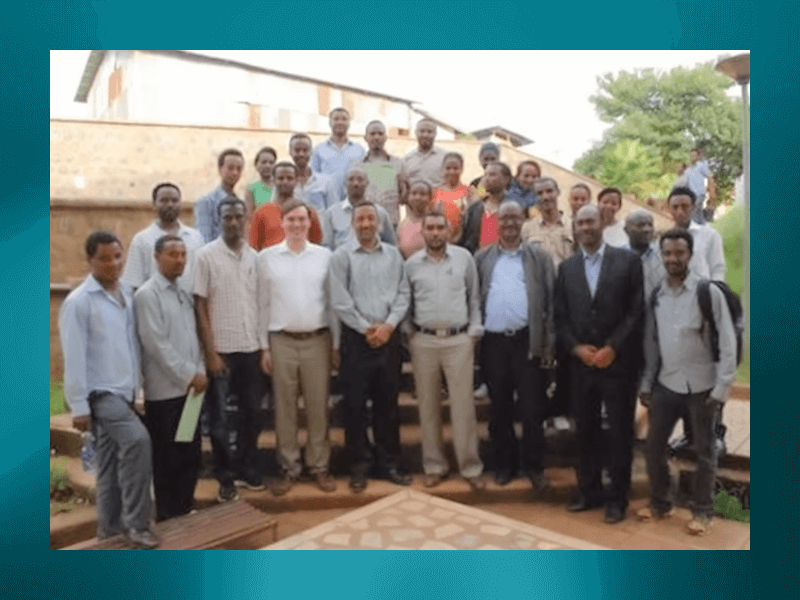
UNT Libraries Participate in U.S.-Ethiopian Universities Innovative Partnerships Program
UNT and Texas A&M Libraries worked with professionals from Jimma, Mettu, and Addis Ababa Universities in Ethiopia toward a goal of improving the institutions’ digital repositories. UNT Libraries received a U.S. Department of State grant to establish innovative collaborations and partnerships with Jimma and Mettu Universities in Ethiopia. In February 2015, Daniel Alemneh, UNT Libraries Digital Curation Coordinator and College of Information Adjunct Professor, and Mark Phillips, UNT Assistant Dean for Digital Libraries, traveled to Ethiopia to meet with Jimma University officials. Based on needs identified during this kickoff meeting, Jimma University organized training in collaboration with University of North Texas, Texas A&M University, and Texas Digital Library, with support from the United States Embassy in Addis Ababa. Daniel Alemneh returned in July along with James Creel, Texas A&M Libraries Senior Lead Software Applications Developer, to provide training on open access and institutional repositories; electronic thesis and dissertation (ETD) lifecycle management; and advanced DSpace administration, configuration and customization. DSpace is an open source repository software package typically used for creating open access repositories for scholarly and/or published digital content. The main focus of the training was improving the institutional repository of the universities through the employment of this software’s functionalities. More than 40 professionals from Jimma University, Mettu University, and Addis Ababa University attended the four-day training session at Jimma University in Jimma, Ethiopia. The participants were able to install and manage their own servers on Windows and Linux platforms and experiment hands-on with controlling access, metadata, submission, and information discovery interfaces. The excellent computing facilities and expert technical support at Jimma University made these technical accomplishments possible. The primary goal of the[U.S. Department of State grant was to establish innovative partnerships between higher education institutions in Ethiopia and in the U.S. The specific objectives were to: grow mutually beneficial and sustainable partnerships between U.S. and Ethiopian universities and colleges introduce new higher education institutions to U.S. and Ethiopian partnerships strengthen the skills and experience of faculty and administrators in both countries in developing and implementing partnerships Related News Sources: [Five U.S.-Ethiopian Universities Partnerships to Receive U.S. Embassy Seed Money Grants][1] [UNT Libraries awarded U.S. Department of State Grant][U.S. Department of State grant] [JU hosts a Training on DSpace Software][participants] digital_libraries_in_the_news_honors_and_awards_grant_award
Posted:
07/30/2015
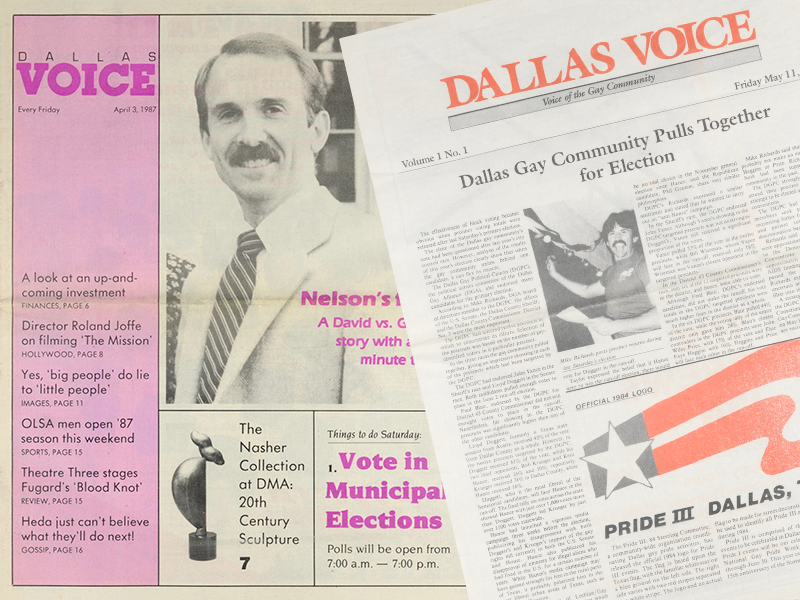
UNT Libraries Digitize Dallas Voice
More than 79,000 pages of Dallas Voice have been digitized by the University of North Texas Library as part of its Portal to Texas History. More than 79,000 pages of Dallas Voice, dating back to the first issue on May 11, 1984, have been digitized by the University of North Texas Library as part of its Portal to Texas History. The issues are in searchable PDF format — not only the articles, but photo captions and ads as well. Grants from the Institute of Museum and Library Services and Texas State Library and Archives Commission funded most of the project. The school received some additional funds and is still fundraising to make up the difference. Dreanna Belden, UNT libraries’ assistant dean for external relations, said they underestimated the number of pages and are still trying raise about $7,000 for the $32,000 project. Digitizing the newspaper began as an offshoot project of The Dallas Way, the North Texas LGBT history project that is collecting artifacts and written and oral histories of the community. The Dallas Way connected with UNT early on in its efforts. “UNT already had committed to being the largest LGBT repository in the Southwest,” said Robert Emery, one of The Dallas Way’s founders. To learn more, please see the Dallas Voice article, UNT Digitizes Dallas Voice. external_relations_in_the_news_collection_highlight
Posted:
07/17/2015
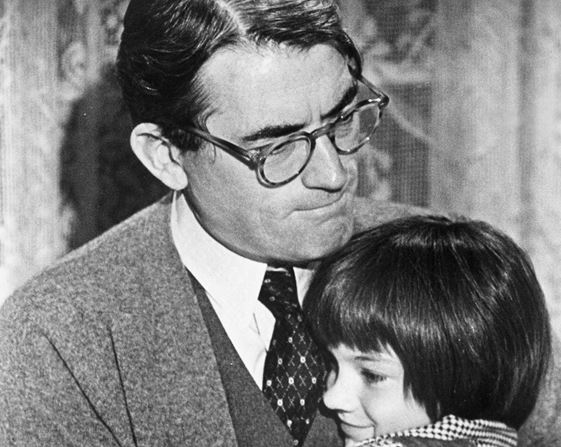
Harper Lee: From Mockingbird to Watchman
Check out the newly released documentary about Harper Lee, author of To Kill a Mockingbird and the new novel, Go Set a Watchman, free until July 15, 2015. Kanopy Streaming Video is one of our newest platforms for streaming video, with thousands of options available anytime, 24/7. Until July 21, 2015 they are offering access to the new documentary Harper Lee: From Mockingbird to Watchman. Check back soon to find this and other films available through the UNT Library catalog. eresources
Posted:
07/15/2015
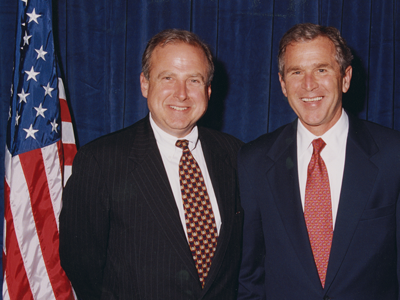
History-making "Austin 12" LGBT Archive Acquired by the UNT Libraries
Charles C. Francis has donated his entire collection of materials from the historical meeting of the “Austin 12” in 2000 to the UNT Libraries. The year was 2000, and a personal friend of then-Texas Gov. George W. Bush – Charles C. Francis – was breaking a barrier for gay-rights advocates by holding a meeting with the governor and 11 other gay Republican men and women. It was the first time a Republican presidential candidate had ever formally and publicly met with a group of openly gay and lesbian individuals. On the agenda for the group known as the “Austin 12”: a frank conversation about gay and lesbian issues, sharing personal stories as gay and lesbian Republicans and a discussion about Bush’s presidential candidacy. Now – nearly 15 years to the date of that meeting on April 13, 2000 – Francis has donated his entire collection of materials from that historic meeting of the “Austin 12” to the University of North Texas Libraries. The Charles C. Francis collection contains documentation of the meeting, internal materials and memos from the Republican Unity Coalition. Started by Francis after the Austin 12 meeting, the coalition is a gay and straight advocacy group and political action committee dedicated to making sexual orientation a non-issue within the Republican Party. Additionally, the UNT libraries will receive correspondence between Francis and prominent Republicans such as President George W. Bush, Sen. Alan K. Simpson, President Gerald R. Ford and Mary Cheney, as well as materials detailing press coverage that documents the struggle of gay Republicans to influence the direction of the GOP within their party. To learn more, please see the UNT News article, History-making “Austin 12” LGBT archive acquired by University of North Texas Libraries. special_collections_in_the_news_did_you_know_collection_highlight
Posted:
07/07/2015
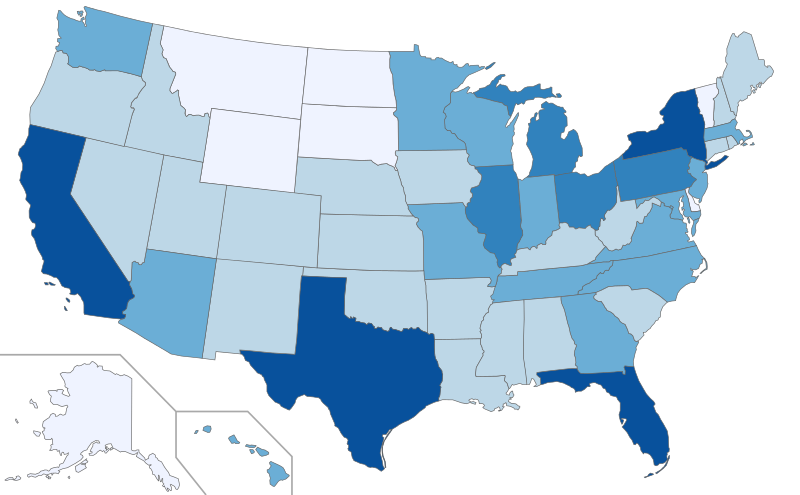
Bernan Press Digital Library
Bernan Press now offers subscriptions to its vast array of legal, government, and statistical publications.Subjects covered include population, race, employment, business information, education and much more. Bernan Press now offers subscriptions to its vast array of legal, government, and statistical publications. Subjects covered include population, race, employment, business information, education and much more. Titles can be accessed by an unlimited number of users and can be read on a desktop, mobile, or tablet web browser. Included are two series to which we currently have standing orders (U.S. Databook and Country and City Extras). This platform provides an upgraded interface as well as updated content for these. Please provide feedback with this brief survey or by emailing erin.miller@unt.edu. collection_development_eresources
Posted:
07/06/2015

Grants for non-tenure-track faculty available for publishing with Eagle Editions
UNT Libraries Scholarly Publishing Services is pleased to announce a competition for grants to UNT teaching faculty for use towards publication fees to publish new works of scholarship under the Eagle Editions imprint. Thanks to generous support from the UNT Libraries’ Dean’s Innovation Fund, UNT Libraries Scholarly Publishing Services will make up to five grants of up to $1,000 in the fall of 2015. At least one of the authors of editors of the work of scholarship must be a non-tenure-track teaching faculty at any UNT campus. Applications must include: a complete manuscript for the book an abstract of the manuscript (no more than 1,000 words) a short statement (no more than 1,000 words) explaining the value of making this work available for free online and, optionally, for sale in print and/or e-book formats Applications must be submitted by October 1, 2015 to Kevin.Hawkins@unt.edu. They will be reviewed by a committee including representatives from the UNT Libraries, the Office of Faculty Success, and colleges on the Denton campus. Decisions are expected in November 2015 with publication to take place during 2016. administrative_office_honors_and_awards
Posted:
07/01/2015
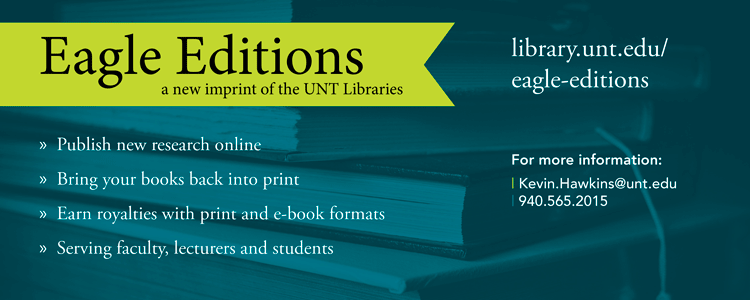
Libraries create new publishing service for UNT community
The UNT Libraries have launched a new publishing service meant to complement the UNT Press. Eagle Editions, an imprint of the UNT Libraries, is designed for works of scholarship from the UNT community. All books from Eagle Editions are freely available to read online, and some are available in print, as e-books, or both. Eagle Editions is just one of a number of publishing-related services provided by the UNT Libraries: Scholarly Open Access E-journal Support: This service makes scholarly journals edited at UNT free to read online. UNT Scholarly Works: a repository for UNT faculty and staff to deposit the results of their research, whether published elsewhere or not UNT Data Repository: a central archive for the datasets of UNT researchers Editors’ Roundtable: occasional meetings of editors of journals and book series to share best practices advice on copyright, licensing, open access, and related issues of scholarly communication administrative_office_new_service
Posted:
06/26/2015
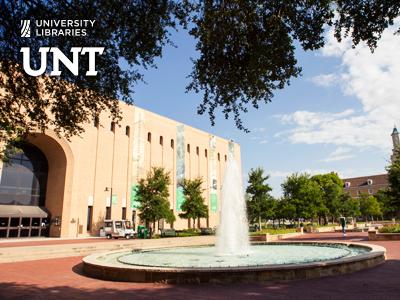
UNT Libraries Award Research Fellowships
The UNT Libraries have announced the 2015-16 Fellowship Awards from Special Collections and The Portal to Texas History. The UNT Libraries have announced the 2015-16 Fellowship Awards from Special Collections and The Portal to Texas History. Winners are invited to spend a week in residence at UNT conducting research, and each are also invited to present a brief overview of their research during their residency as part of a Fellowship Lecture Series. The winners of the Special Collections Fellowship are: Oliver Burtin, Graduate student in History at Princeton University Title of Project: The American Legion and Veterans’ Politics Laura Forsberg, Ph.D. candidate in English at Harvard University Title of Project: The Victorian Miniature Book William A. Taylor, Assistant Professor of Security Studies at Angelo State University Title of Project: In the Service of Democracy: American Military Service from World War II to the Present The winners of the Portal to Texas History Fellowship are: Ben Davis, Graduate student in Library and Information Science at the University of North Texas Title of Project: Historic Architecture of Harrison County Texas Evan C. Rothera, Ph.D. candidate in History at Pennsylvania State University Title of Project: “There are in Texas Men who have suffered much”: Reconstruction in the Lone Star State Nakia Parker, Graduate student in History at University of Texas, Austin Title of Project: Life along the Red River: Gender, Slavery, and Emancipation in the Nineteenth-Century Southwest Borderlands Each fellowship recipient’s lecture will be free and open to the public, and will be placed on the calendar of events at http://www.library.unt.edu. For more information, contact Mandy Rausch at 940-565-2499 or mandy.rausch@unt.edu. external_relations_in_the_news_honors_and_awards
Posted:
06/15/2015
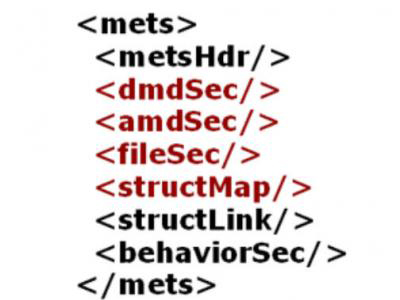
UNT Libraries' METS Profile Now Registered with Library of Congress
For six years the UNT Libraries have used METS to serialize digital objects. Now our local implementation has been accepted by the METS community and registered with the Library of Congress. History of METS In the digital library world there is a metadata standard called the Metadata Encoding and Transmission Standard (METS). This standard has been in development in the digital library community for over a decade with roots back to the early Making of America II project in 1998. Currently, the standard is maintained in the Network Development and MARC Standards Office of the Library of Congress. But what is it? The METS format allows digital libraries to encode information about digital objects in a way that can be read and deciphered by others in the digital library world. METS has seven main areas that act as containers for information common across digital objects. These containers include: METS header - metsHdr Descriptive Metadata - dmdSec Administrative Metadata - amdSec File Section - fileSec Structural Map - structMap Structural Links - structLink Behavioral - behaviorSec Using these different containers to encode and serialize metadata about the attributes of a digital object allow practitioners in the digital library area to have a consistent way of denoting, presenting, and building systems with a common format. METS Profiles One of the challenges with METS is that each organization that implements METS will do it in a slightly different way because of local needs. To make this sustainable the METS community has a standardized way of describing how an institution uses METS: what it requires, makes optional, and forbids in its implementation. An organization can register its profile with the Library of Congress where it will be evaluated by the METS Editorial Board, and by the METS community before it is formally accepted as a METS Profile. So what’s the news? In the UNT Libraries we have been using METS to serialize our digital objects for the past six years, and we’ve finally gone through the process of having our local METS implementation accepted by the METS Editorial Board, the METS community, and the Library of Congress as the newest METS Profiles. Ours is the 45th profile to be accepted over the past decade or so. If you are interested in seeing the profile, here is the link (warning, big blob of XML): http://www.loc.gov/standards/mets/profiles/00000045.xml We formalized our use of METS in this METS Profile as part of a self-audit of our repository infrastructure as we work to document how we are a trusted digital repository. For additional information about METS, take a look at the Library of Congress site: http://www.loc.gov/standards/mets/ For the news release at the Library of Congress, see: http://www.loc.gov/standards/mets/news052115.html digital_libraries_in_the_news
Posted:
06/11/2015
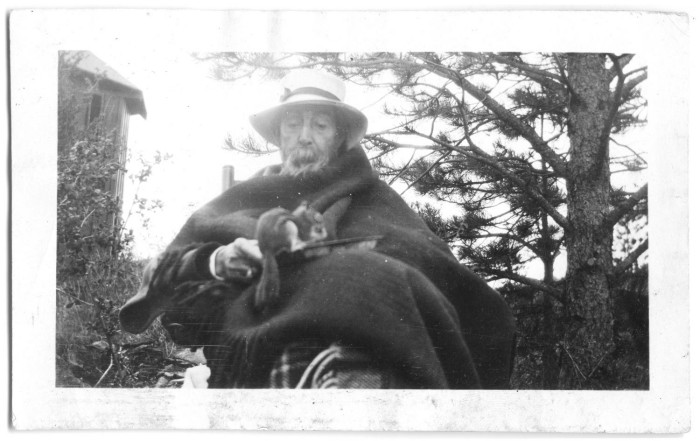
A Scurry of Squirrels in the Digital Collections
Learn more about UNT’s albino squirrels and their furry cousins by visiting the UNT Digital Collections. Want more information about the albino squirrel and his furry cousins? Check out some of these resources in the UNT Libraries’ Digital Collections: Learn how to make a squirrel feeder or attract other wildlife to your yard Read up on the behaviors of ground squirrels Play a German Squirrel Game Discover more about The Texas Ground Squirrel: Its Habits and Its Haunts Consider photographing squirrels and other wildlife Of course, there is plenty of information in the Digital Collections about UNT’s own albino squirrel(s). The Albino Squirrel Preservation Society is mentioned in issues of The North Texan, including this 2002 issue, and in the 2005 yearbook. The squirrels also appear in the North Texas Daily on multiple occasions including an “in memoriam” note about the albino squirrel killed in 2006, and a story about the memorial service. Find more items about squirrels in The Portal to Texas History or the UNT Digital Library, or search for other summer wildlife. –submitted by Hannah Tarver, Head, Digital Projects Unit digital_libraries_collection_highlight
Posted:
06/05/2015
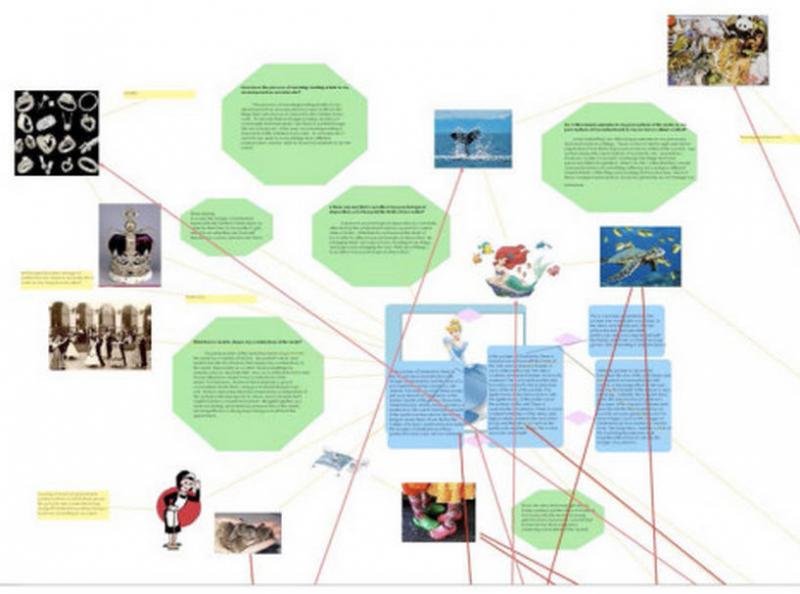
The Innovative ETD Award 2015 Winner
Dr. Matthew Sutherlin is the Innovative ETD Award 2015 Winner. Matthew Evans Sutherlin, Doctor of Philosophy (Art Education), College of Visual Arts and Design (August 2010): In his doctoral dissertation entitled: “image”/ “i” / “nation”: A Theory and Practice of Becoming an A/r/tographer,” Dr. Matthew Sutherlin played on the concept of the imagination and produced an arts-based dissertation to rethink assumptions of self. He argues that embracing technological models may produce students who are illiterate in the “proper” methods of communication. With rapid technological change, some fear traditions in their “original” form may be lost. Practices such as trying to recapture the artist’s intent should be abandoned as a way of opening up literacy discourse to multiple narratives. Failing to critically explore the possibilities of emerging models of thinking, teaching, and learning in a technological culture can produce a loss equal to the loss of tradition. Dr. Sutherlin’s research showed that through reflexive application the imagination is split-allowing connections and disconnections through practice. By engaging in its application the teacher and students became better able to formulate new ways of negotiating curricula, literacy practice, and artistic production. Dr. Matthew Sutherlin is currently the Chair of Curriculum and Instruction at Henderson State University. Originally from El Dorado, Arkansas, Dr. Sutherlin obtained his Bachelor of Fine Arts from the University of Central Arkansas, Master of Fine Arts from the University of Massachusetts at Amherst, and his Ph.D. in Art Education from the University of North Texas. Dr. Sutherlin continues to investigate new media literacies, mashups and remix culture, game-based learning, maker education and design thinking. His most recent article on new media methods of assessment “(Un)Charted Cartographies: Mapping Networked Avatars” was published last year in the Journal of Social Theory in Art Education. Currently, Dr. Sutherlin is working on the development of an after-school program for students in Southwest Arkansas that deals with STE[A]M education. Students in this program will learn coding, 3D printing, and design thinking through game-based and maker methodologies. We are pleased to present the 2015 UNT Innovative ETD award to Dr. Matthew Evans Sutherlin. digital_curation_unit_honors_and_awards
Posted:
06/02/2015
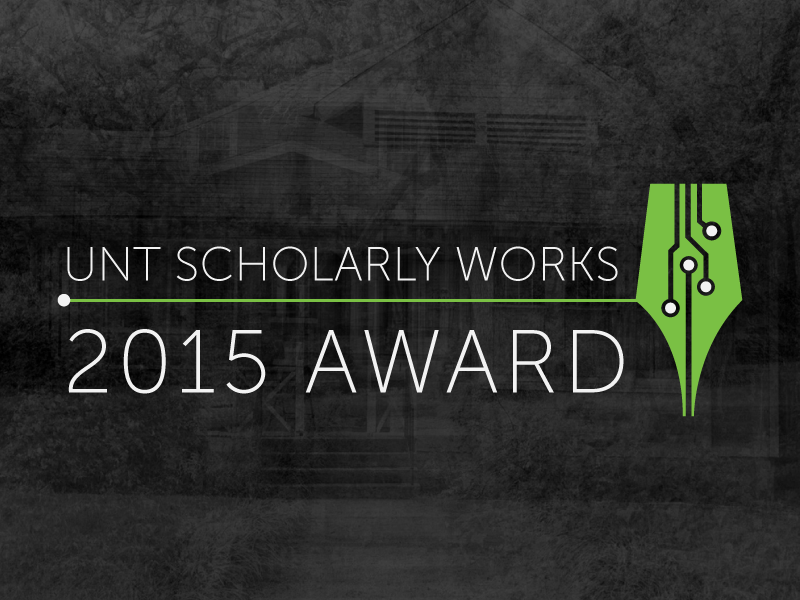
UNT Scholarly Works Outstanding Contributor Award 2015 Winners
About the Award This award recognizes a researcher who has made significant contributions to the UNT Scholarly Works institutional repository over the last year (April 1st 2014 through March 31st 2015). Significance is determined by a variety of characteristics including: donating the entirety, or a major portion, of a researcher’s scholarly corpus; donating a large number of individual titles; or donating research materials that demonstrate a significant scientific advance or societal impact. Employees of the UNT Libraries are ineligible for this award. 2015 Winners Dr. Nicoladie D. Tam Dr. Nicoladie Tam is a Professor of Biological Sciences in the UNT Biological Sciences Department. Her research interests include computational and experimental neuroscience in emotional and cognitive processing, EEG, near-infrared optical imaging, motor control, robotics, neuro-prosthetics, brain-computer-interface, decoding of brain signals, and brain simulation. Dr. Tam’s research article, “Computational optimization problems in social interaction and empathetic social emotion,” was one of the most used items in the UNT Scholarly Works institutional repository this past year. Dr. Miguel Acevedo Dr. Miguel Acevedo is Regents Professor in the Electrical Engineering Department and Geography Department. His research interests include sensors, real-time environmental monitoring, ecological and environmental modeling, biocomplexity, agent-based coupled human-natural models, watershed-reservoir management and hydroelectric energy, urban systems, and complex models of land use change. Dr. Acevedo’s research article, “Relaciones alométricas y patrones de crecimiento para especies de árboles de la reserva forestal Imataca, Venezuela,” was one of the most used items in the UNT Scholarly Works institutional repository this past year. digital_libraries_honors_and_awards
Posted:
06/01/2015
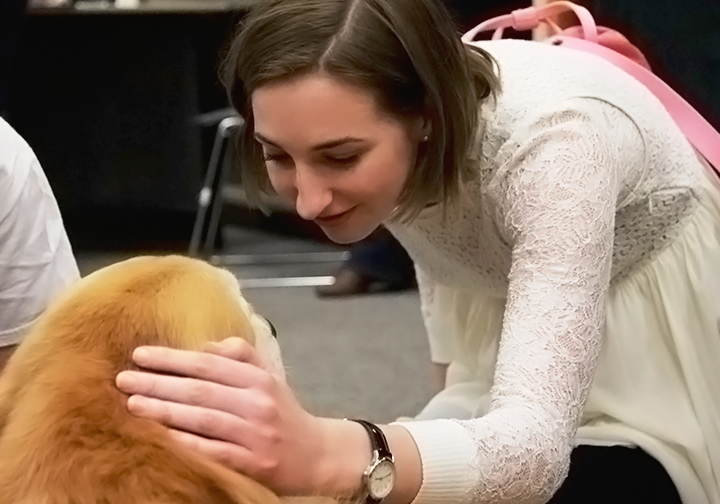
Pet Therapy During Finals Week
Lulu, Buddy, Maggie, Macie, and Garda welcomed students, performed tricks, and offered unconditional love to help relieve student stress during finals week. The Paws Across Texas therapy dogs visited from 2:00 4:00 p.m. on Monday, May 11. Dog therapy was well attended with approximately 500 students filling the Willis Forum. Paws Across Texas, Inc. (PAT) is a nonprofit, incorporated, charitable organization founded in 1986 and based in Fort Worth, Texas. Its purpose is to provide diversified therapy programs using trained volunteers (representatives) and their privately owned companion animals (registered therapy dogs). Featured image: Emily Peebles and Garda Photo credit: Megan Gellner public_services_in_the_news
Posted:
05/15/2015
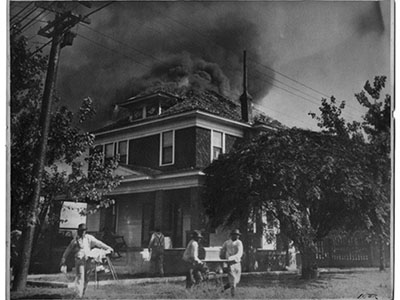
Mini-Grants Help Rescue Texas History
Learn about the history of the Rescuing Texas History Mini-Grant Program at UNT Libraries. Established in 2002, The Portal to Texas History (Portal), began with the mission to provide students and lifelong learners a digital gateway to primary source materials held in Texas libraries, museums, archives, historical societies, and private collections. One way in which the Digital Libraries Division has worked towards achieving this mission is through the Rescuing Texas History (RTH) grant program. Originally called Rescuing Texas History through the Digitization of At-risk Photographs and Maps, RTH has enabled the Portal to be populated with a rich variety of unique materials for public access. This mini-grant program is open to institutions and individuals who own historic Texas-related materials. Grant winners, called partners, enjoy the benefits of having their materials digitized, described, and hosted on The Portal to Texas History. After digitization, the original materials are returned to partners along with digital copies for their own use. The program began in 2006 with nineteen applications and 11 funded projects. It was originally funded with a $7,500 grant from the Summerlee Foundation of Dallas. The funds are spent on the wages of our imaging and metadata workers, costs of hosting the images, and mailing of materials. So far, RTH has digitized over 37,000 items for 130 partners. Many partners have gone on to apply for and receive larger funding for bigger projects. One example is the Tocker Foundation Grant won by Texas Southern University to digitize speeches and scrapbooks from their Barbara Jordan Archive. Concordia University also received a Texas State Library and Archives TexTreasures grant to digitize over 600 of their university’s Texas Records. After providing access to their materials in the Portal, many partners have also received the benefit of increased reprint and licensing requests for their images to be used in books and documentaries . Thanks to RTH, institutions such as the Dallas Police Department and the Dallas Municipal Archives have allowed access to collections relating to the John F. Kennedy Assassination and Bonnie and Clyde. Today the Rescuing Texas History program is funded by the UNT Libraries. Current and future partners are encouraged to apply for $1000 grants to digitize newspapers, photographs, books, documents and other materials deemed valuable to Texas history. For more information about partnering with the Portal, visit our program page. To apply for a 2015 RTH mini-grant, see our submission guidelines. You can browse the collections from previous RTH years: 2006, 2007, 2009, 2010, 2011, 2013, 2014 digital_libraries_about_the_libraries_collection_highlight
Posted:
05/13/2015
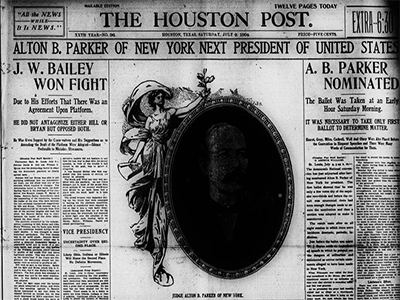
Make the Past Present with Historic Houston Post Issues in The Portal to Texas History
The Texas Digital Newspaper Program has added over 100,000 pages of the Houston Post A great deal of fun in adding primary source content to The Portal to Texas History is that we get to research newspapers and learn about the concrete effects they had on the world of the past. Very recently, the Texas Digital Newspaper Program (TDNP) has added a significant portion of the Houston Post run to its collection. Ranging from 1903 to 1923 and containing over 100,000 pages, this new addition enables us to step into the shoes of the people who lived through and shaped history in Texas, the U.S., and even worldwide. In other words, like all newspapers, these pages make the past current for present-day readers. This addition of the Houston Post represents a succeeding title to the earlier content of the Houston Daily Post, which is another collection in the TDNP. The Houston Daily Post formed in 1886, establishing itself as the premier paper in Houston, and one of the leading daily publications in Texas. The paper was led by future U.S. Senator Rienzi M. Johnston and business manager Julius L. Watson. Shortly after its formation the Houston Daily Post could claim a circulation of 6,000. By 1901, circulation had climbed to 14,207. The Daily Post maintained an $8.00 annual subscription rate. One of Johnston’s most inspired actions was recruiting William Sydney Porter, whom you may know better as O. Henry. In 1895, soon after reading an issue of O. Henry’s short-lived weekly, the Rolling Stone, Johnston arranged to hire Porter for the Daily Post. O. Henry’s various writing assignments included witty daily editorial columns appearing under the banner of, first, “Tales of the Town,” then, “Postscripts and Pencillings,” and finally, “Some Postscripts.” These articles ranged from a half to a full column and were typically unsigned. His last column for the Daily Post appeared on June 22, 1896. In September of 1900, the Houston Daily Post presented one of the most important Gulf Coast news stories of the early 20th century–the great Galveston Hurricane. Devastating one of the largest shipping ports in the world, the Galveston Hurricane was front page news for many issues of the daily Houston Post because Houston was the closest fully-operational city to cover the storm damage in Galveston. Articles in the Post about the hurricane began appearing shortly before it hit Galveston, with snippets on September 8th stating, “A tropical hurricane did damages on the Florida coast, driving two vessels ashore.” On September 10th, the Daily Post’s headline story announced, “THE FATE OF GALVESTON: ONE THOUSAND PERSONS DROWNED, KILLED, OR MISSING, IT IS ESTIMATED.” Throughout the month of September 1900, a common sight were lists of the dead showing the lives lost to the hurricane. As the September 11, 1900, issue states, “On the flotsam of bay and gulf are unidentified who reach the shore like seaweed floating on the ocean’s surface. Many have drifted out to the depths of the gulf to become prey for sharks and fishes. Others have floated to the shore, where, being unidentified they are consigned to mother earth from which they sprang without shroud or coffin or the customary burial rites. These are sad circumstances to chronicle, but they are true.” By the end of September, the hurricane still appeared in the news, though less prominently: “Texas Politics—State. Much progress has been made in rehabilitating Galveston. Governor Sayers is highly commendatory of the work being done at Galveston and by the Houston relief committee.” Houston Daily Post reporters became witnesses to history, unknowingly memorializing the people of Galveston in the form of newspaper articles commemorating the plight and loss in their closest neighboring city. In surprising comparison, the city of Houston, according to the September 10th issue of the Post, suffered only one lost human life, despite a great deal of property damage. In mid-1903 the newspaper changed its name to the Houston Post. By 1904, President McKinley had been assassinated and a new presidential election was front-page news. Alton B. Parker of New York was pitted against William Randolph Hearst for the Democratic Party nomination, winning in large part due to long years of service on the judicial bench combined with a closed-mouthed nature that seemed to indicate political neutrality. Endorsed by the Houston Post for the Democratic nomination, Alton Parker went on to lose to Theodore Roosevelt by a landslide in the general election. Despite such a tremendous loss, the two candidates showed good attitudes toward each other and the circumstances, according to the Houston Post: “President Roosevelt Did Not Expect to Receive the Large Majority Given Him,” and “Judge Parker Not Cast Down by Election Result. Congratulated President Roosevelt.” But time moved on. The newspaper office also pioneered modern printing through early adoption of the Mergenthaler linotype machine, a machine that dramatically increased production in the news industry. Facing the threat of a strike by his employees, the newspaper’s business manager, J. L. Watson, replaced human typesetters with this linotype machine, becoming only the third newspaper publisher in the country to implement this technology. Once it proved successful, Mr. Watson himself went into business selling the Mergenthaler machine to other publishers across the country, making a fortune in the process. At their peak, there were over 12,000 of the Mergenthaler linotype machines in use, making it an industry standard set by the Houston Post. You can learn more about these machines when you read “The Linotype’s Birthday,” from the April 18, 1911, issue of the Houston Post. The sinking of the steamship, the Lusitania, on May 7, 1915, represented a significant turn of events surrounding the Great War, or what we now refer to as World War I. In Houston, aside from the Associated Press announcements, the Post reported on prominent Texans who had sailed on the Lusitania, as well as on the loss to local industry: “Consignment for the Texas Bag and Fibre Company,” in the form of 1,500,000 yards of burlap “worth $65,000” to the corporation. Although the United States did not enter the war for another two years, the sinking of the Lusitania turned public opinion against Germany. And because everything old becomes new again, the June 24, 1923 issue of the Houston Post reprints O. Henry’s column from 1898, to celebrate the twenty-fifth anniversary of his work at the Houston Daily Post. It’s very easy for us to read history books or to watch television documentaries, but they don’t resonate in the same way as newspapers. It is a completely different feeling to read first-hand, eyewitness accounts of events, to feel what those people went through as they watched history taking place. This feeling is something our students understand, and it is something researchers act on to better grasp how events shape the course of history. In the Texas Digital Newspaper Program we are constantly adding newspapers from any date in time to the Portal. Because we plan for newspapers to be freely accessible in the long term, it’s fun to imagine how future readers might use more recent issues to understand how we live now! –submitted by Ana Krahmer, Supervisor, Digital Newspaper Unit digital_libraries_collection_highlight
Posted:
05/07/2015
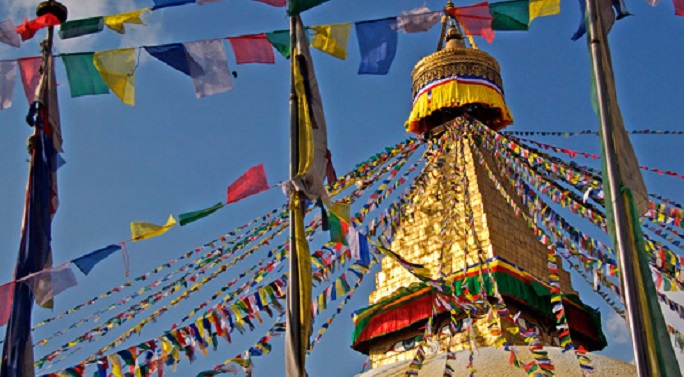
Bernan Digital Press, Gale Legal Forms and eHRAF World Cultures
The library is currently offering trials of three different online resources - [Bernan Digital Press][], Gale LegalForms and eHRAF World Cultures. Trials give you the chance to have a say in what the library collection contains so please take a moment to evaluate these and provide feedback. Check out this vast array of legal, government, and statistical publications. Individual books may also be purchased through the platform. Subjects covered include population, race, employment, business information, education and much more.Titles can be read on a desktop, mobile, or tablet web browser and are available as long as you have an Internet connection. Included are two series to which we currently have standing orders: U.S. Databook and Country and City Extras. Gale LegalForms provides a comprehensive look at various types of legal documents. Our forms are “attorney forms” – officially approved forms actually used at a typical law firm, and very different from those documents found in form books that may not have been drafted by an attorney. LegalForms is also the only electronic reference to offer legal forms that are truly state-specific. Many of the forms and documents are available in Word or Adobe format and can be edited and used with minor modifications to suit users’ needs by simply “filling in the blanks” with relevant and accurate information. Completed sample forms are also included. The Law Digest content fully illuminates today’s leading cases, major statutes, legal terms and concepts, notable persons involved with the law, important documents and more. Legal issues are fully discussed in easy-to-understand language, including such high-profile topics as the Americans with Disabilities Act, capital punishment, domestic violence, gay and lesbian rights, physician-assisted suicide and thousands more. Access the trial at http://www.galetrials.com/default.aspx?TrialID=96235;ContactID=138071 until May 26, 2015. Please provide feedback with this brief survey or by emailing erin.miller@unt.edu. eHRAF World Cultures at a Glance:\ Collection of documents (e.g. books, journal articles, monographs)\ Cultures organized by regions, subregions and subsistence types\ Powerful searching with cultures, subjects, keywords\ Detailed subject-indexing covering all aspects of social and cultural life\ One of eHRAF’s most powerful aspects is Advanced Search, where you can build a search using cultures, subjects and keywords. Access the trial at http://ehrafworldcultures.yale.edu/ehrafe/ until June 26, 2015. Please provide feedback with this brief survey or by emailing erin.miller@unt.edu. eresources
Posted:
05/05/2015
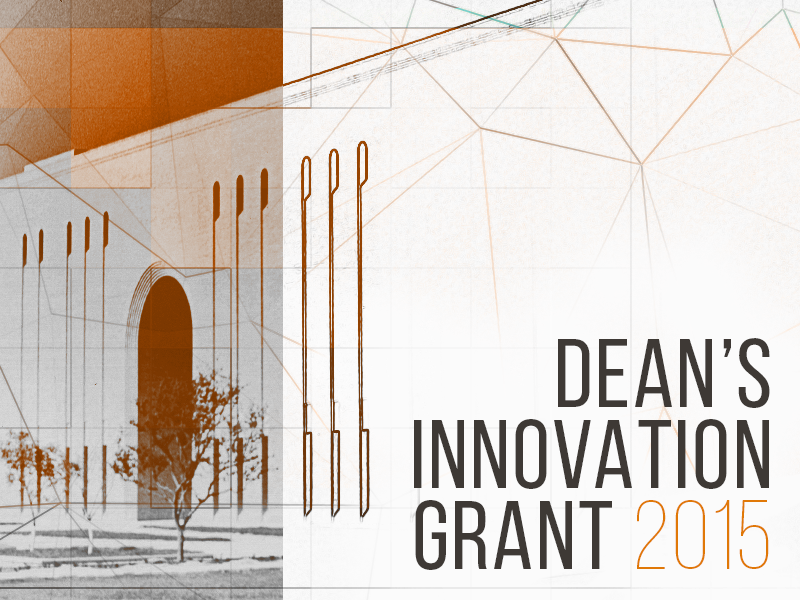
Dean's Innovation Grant 2015: Information-seeking behaviors of documentary filmmakers
Documentaries offer a wealth of information and are an invaluable source of information for educators and casual viewers alike. UNT has a healthy collection of moving image archives that could prove very useful to documentary filmmakers as they compile their works. The goal of this project was to understand how documentary filmmakers get their information, and what role moving image archives play in their creative process. The University of North Texas Libraries’ Dean’s Innovation Grant, formerly known as the Green Light To Greatness Award, provides funding to research and projects within the UNT Libraries that promote scholarship and contribute to the gathering of knowledge that helps improve our libraries, our university, and the community. Dean’s Innovation Grant 2015 Awardees Julie Judkins, Laura Treat Project Title Information-seeking behaviors of documentary filmmakers using moving image archives Project Description Documentaries offer a wealth of information and are an invaluable source of information for educators and casual viewers alike. UNT has a healthy collection of moving image archives that could prove very useful to documentary filmmakers as they compile their works. The goal of this project was to understand how documentary filmmakers get their information, and what role moving image archives play in their creative process. Contributor Biographies Julie Judkins is the Assistant Head for Special Collections in University Libraries Special Collections. She received her Master of Science from the University of Michigan in Archives and Libraries. Laura Treat is the Moving Image Preservation and Digitization Librarian in the UNT Media Library. administrative_office_in_the_news_honors_and_awards_dean_s_innovation_grant
Posted:
05/01/2015
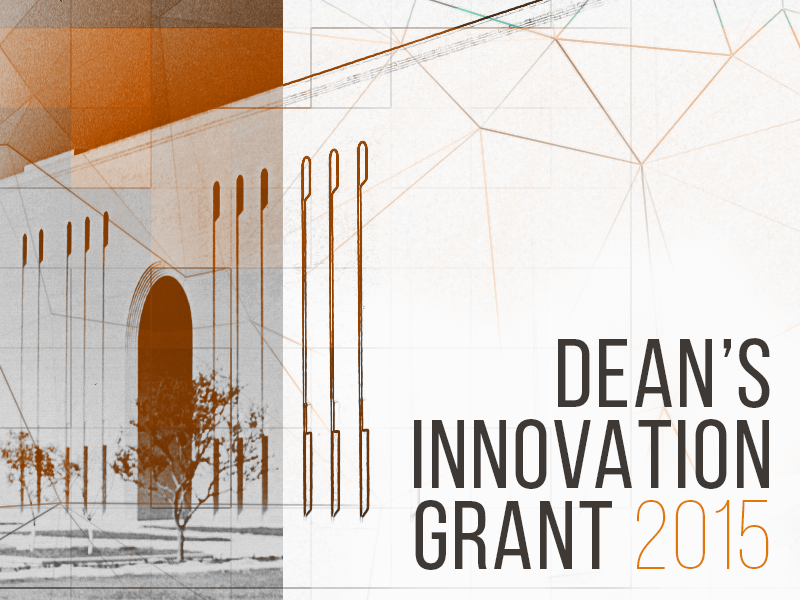
Dean's Innovation Grant 2015: Table Top Game Processing and Preservation
The UNT Media Library has a collection of table top games. These games, when checked out frequently and by many different people, could become damaged through heavy use. This project aimed to find a better way to preserve table top games so they could be enjoyed by more people. In order to figure out the best way of preserving these games, the researchers devised a project that would track the results of various game preservation techniques. The University of North Texas Libraries’ Dean’s Innovation Grant, formerly known as the Green Light To Greatness Award, provides funding to research and projects within the UNT Libraries that promote scholarship and contribute to the gathering of knowledge that helps improve our libraries, our university, and the community. Dean’s Innovation Grant 2015 Awardees Jessica Phillips, Diane Robson, Steven Guerrero Project Title Table Top Game Processing and Preservation Research Case Study Project Description The UNT Media Library has a collection of table top games. These games, when checked out frequently and by many different people, could become damaged through heavy use. This project aimed to find a better way to preserve table top games so they could be enjoyed by more people. In order to figure out the best way of preserving these games, the researchers devised a project that would track the results of various game preservation techniques. Contributor Biographies Jessica Phillips is the Head of Preservation in Special Collections. She received her Master of Library and Information Science in Preservation Management from the University of Pittsburgh. Diane Robson is a Media Cataloger in the Media Library. She received her Master of Library and Information Science from UNT. Steven Guerrero is the Media Circulation Manager for the UNT Media Library. administrative_office_in_the_news_honors_and_awards_dean_s_innovation_grant
Posted:
05/01/2015
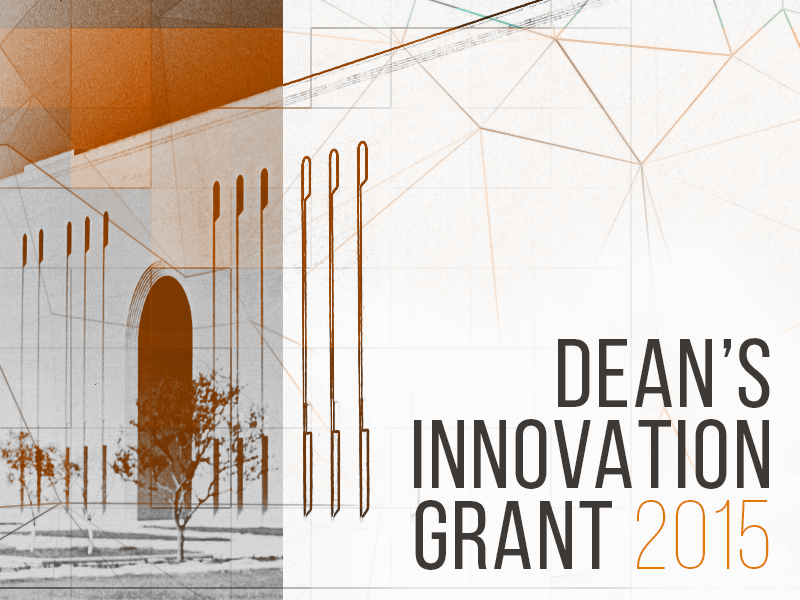
Dean's Innovation Grant 2015: Investigations into the Third Dimension
As 3D scanning’s popularity has increased over the past few years, its various uses span academic, government, and many other settings. This project’s goal was to determine the usefulness of 3D scanners in the setting of UNT Libraries, and to investigate whether the Libraries should continue to pursue 3D scanning, and if so, to give undergraduate students hands-on experience with the necessary equipment. The University of North Texas Libraries’ Dean’s Innovation Grant, formerly known as the Green Light To Greatness Award, provides funding to research and projects within the UNT Libraries that promote scholarship and contribute to the gathering of knowledge that helps improve our libraries, our university, and the community. Dean’s Innovation Grant 2015 Awardees Marcia McIntosh Project Title Investigations into the Third Dimension: 3D Scanning in UNT Libraries Digital Collections Project Description As 3D scanning’s popularity has increased over the past few years, its various uses span academic, government, and many other settings. This project’s goal was to determine the usefulness of 3D scanners in the setting of UNT Libraries, and to investigate whether the Libraries should continue to pursue 3D scanning, and if so, to give undergraduate students hands-on experience with the necessary equipment. Contributor Biographies Marcia McIntosh the Digital Production Librarian in the Digital Projects Lab. She has a Master of Science in Information Science from the University of Texas at Austin. administrative_office_in_the_news_honors_and_awards_dean_s_innovation_grant
Posted:
05/01/2015
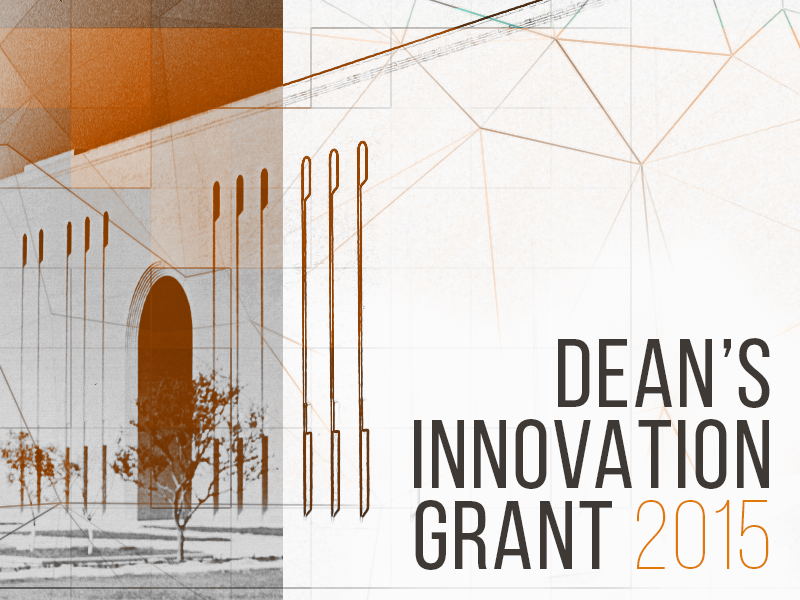
Dean's Innovation Grant 2015: Historic UNT Webmap
UNT’s history is a rich tapestry made up of many interwoven threads of people, events, and culture. This project’s goal was to compile this history into an interactive webmap, where students and Denton residents alike could watch the city’s transformation before their eyes and expose them to library collections. The University of North Texas Libraries’ Dean’s Innovation Grant, formerly known as the Green Light To Greatness Award, provides funding to research and projects within the UNT Libraries that promote scholarship and contribute to the gathering of knowledge that helps improve our libraries, our university, and the community. Dean’s Innovation Grant 2015 Awardees Douglas Burns, Robbie Sittel Project Title Historic UNT Webmap Project Description UNT’s history is a rich tapestry made up of many interwoven threads of people, events, and culture. This project’s goal was to compile this history into an interactive webmap, where students and Denton residents alike could watch the city’s transformation before their eyes and expose them to library collections. To create the webmap, the project team members used a combination of resources from UNT and the greater Denton community. These resources include historic maps, aerial photographs, GIS software, and regular photographs to truly paint a picture of the change the community has experienced through the passage of time. Contributor Biographies Douglas Burns is the Geographic Information Systems Librarian in the Government Information Connection. Robbie Sittel is the Department Head for the Government Information Connection. She has a Master of Library Science from UNT. administrative_office_in_the_news_honors_and_awards_dean_s_innovation_grant
Posted:
05/01/2015
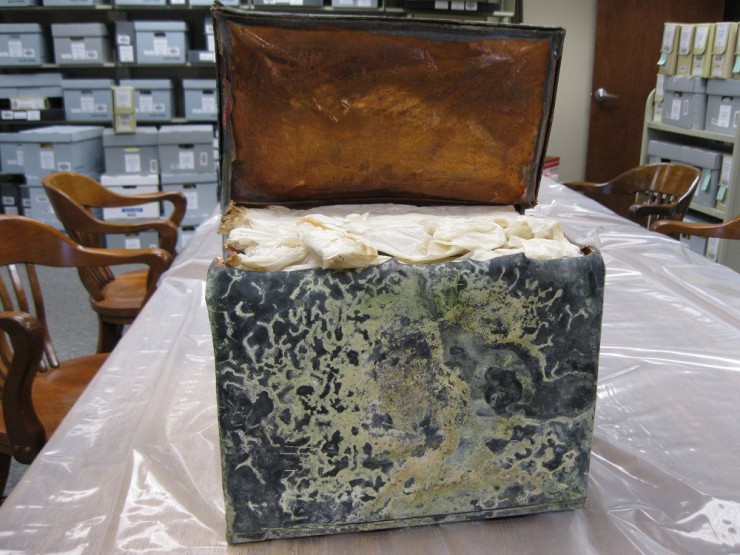
Time Capsules Unearthed on University Day
On April 16 the University of North Texas community came together to celebrate our 55th annual University Day, the anniversary of the day our institution became a University. Prior to May 1961, the North Texas State College had already evolved from a Teacher Training Institute, to a Normal College, and into a Teachers College since its inception in 1890. Our transition from college to university became official following a vote by the Texas legislature and Governor Price Daniel‘s signature. In celebration, the first University Day was held on May 10th, 1961. University Day is now an annual event, celebrated on or around May in celebration of our community achieving this important milestone. In 1962, the United Students of North Texas (the student government association at the time), documented our first year as a university in a time capsule, filling it with items that reflected the activities and concerns of the campus they served. They buried the time capsule in front of the Administration Building as a gift to the future. A second time capsule was buried on University Day in 1988 to commemorate another significant University milestone: the seventh, and last name change, when we adopted our current moniker, the University of North Texas. Though buried over two decades apart, both capsules had one significant similarity: both were designed to be opened on University Day, 2015. The UNT president, along with a smattering of power tools and construction equipment, unearthed both capsules last week, and the Special Collections staff here at UNT Libraries was honored to be among the first to discover what fascinating treasures hid within. You can view a video of the unearthing here. Both capsules were well-preserved due to the materials used to house them. The 1962 capsule alone weighed over 350 pounds! Before they were buried, the artifacts in each capsule were carefully packed into a small copper box measuring 9 x 14 x 11 inches, then cast in either limestone (1962), or steel reinforced concrete (1988). Both boxes were buried in the flowerbed under the flagpole in front of the Hurley Administration building. Special Collections staff were happy to discover almost all the artifacts in the time capsule were in good condition. Due to the steel reinforcements of the 1988 box, University facilities used a water-saw to open the encasement. A small amount of water seeped inside the box, and some of the artifacts got wet. Our preservation Librarian, Jessica Phillips, took swift action to prevent any mold or deterioration, and the items spent the day undergoing various conservation treatments to prevent mold or other damage. The time capsules contained a number of interesting artifacts from the time periods they reflect. As librarians, we were overjoyed to find that BOTH time capsules contained books popular at the time they were buried. The 1962 capsule contained A copy of the 1961 yearbook, the Yucca An audio recording of a speech given by NTSU President Mathews The 1962 Honors Day program The student handbook * Multiple issues of the 1962 student newspaper, the Campus Chat Paperback editions of popular books The Catcher in the Rye by J.D. Salinger Of Mice and Men by John Steinbeck 1984 by George Orwell The Pocket Library edition of Robert Frost’s Poems And, Profiles in Courage by President John F. Kennedy The 1988 capsule contained A copy of the 1988 yearbook, the Aerie A 1962 male NTSU Cheerleader uniform complete with a green and white pompom A VHS taped message from President Hurley to be viewed by the UNT Chancellor in 2015 * Multiple issues of the 1988 student newspaper, the NT Daily Memorabilia from campus blood drive activities: shirts, buttons, vampire teeth, stickers Paperback editions of popular books (donated by Paul Voertman) Bright Lights Big City by Jay McInerney Lonesome Dove by UNT alumnus Larry McMurtry The Closing of the American Mind by Allan Bloom A color portrait of the 1988 NTSU Drumline and a sheet with the members’ contact info The artifacts in the time capsule will be processed by Special Collections staff in the coming months to make them available for an upcoming exhibit. Additional photos of the time capsules and archival photos from the burial of the time capsules are available on our blog: 125th Anniversary Archival Retrospective – by Courtney Jacobs special_collections_in_the_news
Posted:
04/28/2015
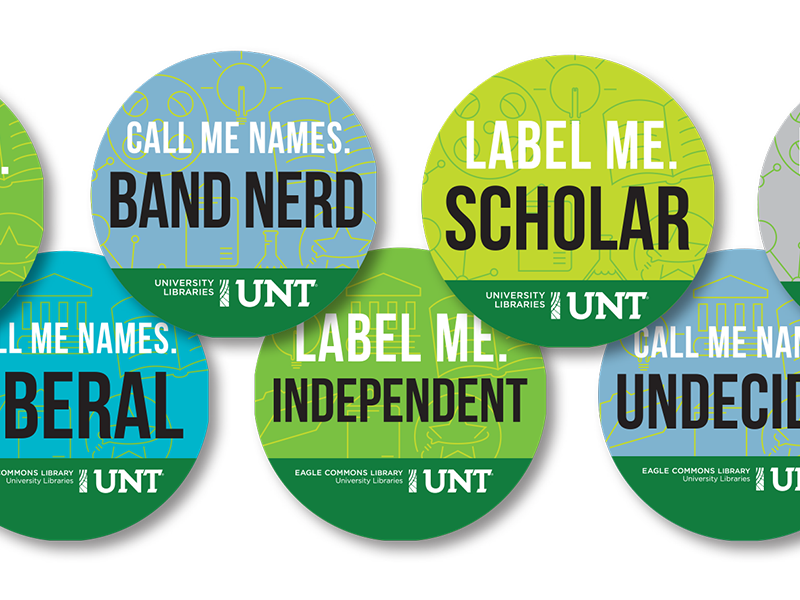
UNT Libraries Win TLA Branding Awards
The External Relations team has been awarded honors in two separate categories of TLA’s Branding Iron Awards. The External Relations team has been awarded honors in two separate categories of TLA’s Branding Iron Awards. A Day at UNT Library video won in the Broadcast Advertising category, and the “Label Me” campaign series of tags and logo designs was a winner in the category of Logos and Brands. The “Label Me” campaign was created based on the concept of taking ownership of nicknames given to individuals and giving those individuals an opportunity to wear their labels proudly and confidently. “Through the Label Me campaign, we have found that the students truly value individualism and invest in what they feel represents their personality and beliefs,” explains Marketing Director Joshua Sylve. “This campaign is really an extension of the Libraries’ many services tailored to the needs and best interests of our diverse student population. “Since the campaign’s launch in 2012, the buttons have been changed to add new labels that vary from nicknames to niche groups that are represented on campus. The buttons disappear almost as soon as they are set out, and the Libraries currently orders over 10,000 of them every semester. Congratulations to the External Relations team for these two well-deserved awards! external_relations_in_the_news_honors_and_awards
Posted:
04/24/2015
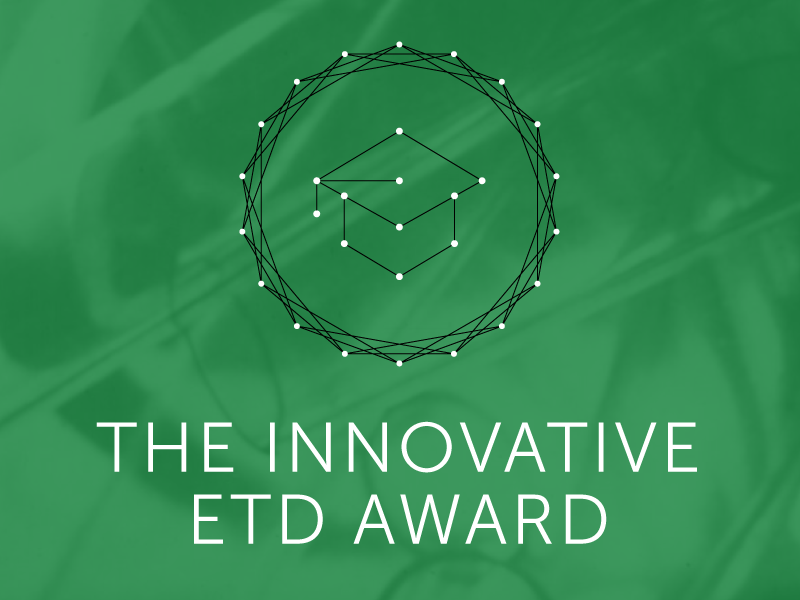
The Innovative Electronic Thesis and Dissertation Award
Sponsored by the UNT Libraries and Toulouse Graduate School, the Innovative ETD Award recognizes UNT students who employ creative approaches and use innovative technologies to enhance the scholarly and popular impact of their electronic thesis or dissertation (ETD). The winner will receive a certificate and a $250.00 gift card. In addition, the winner may be nominated by UNT for the international Networked Digital Library of Theses and Dissertations (NDTLD) Innovative ETD Award and supported for travel to the ETD conference. in_the_news_honors_and_awards
Posted:
04/20/2015
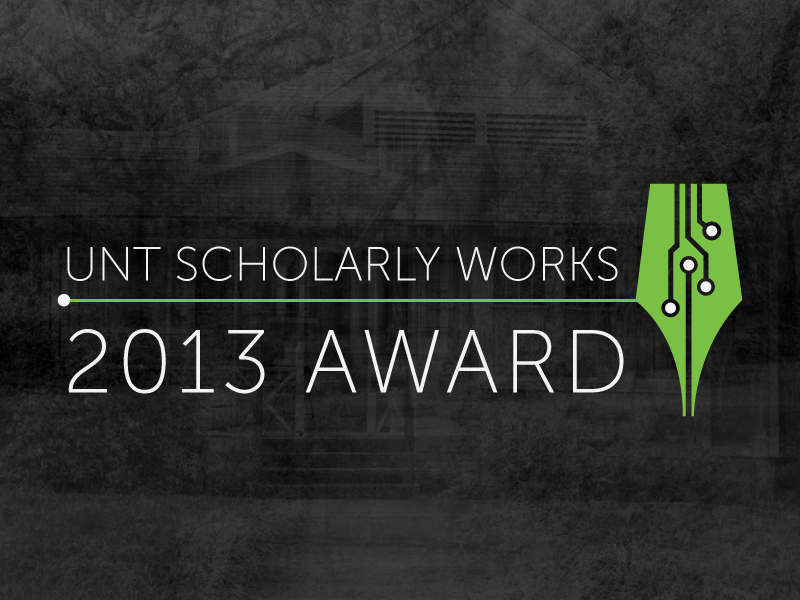
UNT Scholarly Works Outstanding Contributor Award 2013 Winners
About the Award This award recognizes a researcher who has made significant contributions to the UNT Scholarly Works institutional repository over the last year (April 1st 2012 through March 31st 2013). Significance is determined by a variety of characteristics including: donating the entirety, or a major portion, of a researcher’s scholarly corpus; donating a large number of individual titles; or donating research materials that demonstrate a significant scientific advance or societal impact. Employees of the UNT Libraries are ineligible for this award. 2013 Winners Dr. William Acree Dr. William Acree is the chair and a professor in the UNT Chemistry Department. His research interests include solution thermodynamics, development of linear free energy relationships to describe partitioning phenomena of analytical, environmental, and biological importance, chromatographic separations on novel liquid crystalline stationary phases, and photophysical properties of large, polycyclic aromatic hydrocarbons (PAHs). His work involves a wide range of experimental and computational methods, including spectroscopy, chromatography, polarizing light microscopy, densimetry, and principal component analysis. Dr. William Acree’s research work is available in the UNT Scholarly Works institutional repository. Dr. Susan Brown Eve Dr. Susan Brown Eve is the associate dean of the UNT Honors College and a professor in the UNT Sociology and Applied Gerontology Department. Her research interests include access to healthcare services among vulnerable populations including older adults, children, victims of domestic violence, the poor, and the uninsured in the United States. She is the editor of a collected volume of original research on the health care systems of the United States, Great Britain, and Canada entitled The Canadian Health Care System: Lessons for the United States, Lanham, MD: University Press of America (1995). Dr. Susan Eve’s research work is available in the UNT Scholarly Works institutional repository. digital_libraries_honors_and_awards
Posted:
04/17/2015
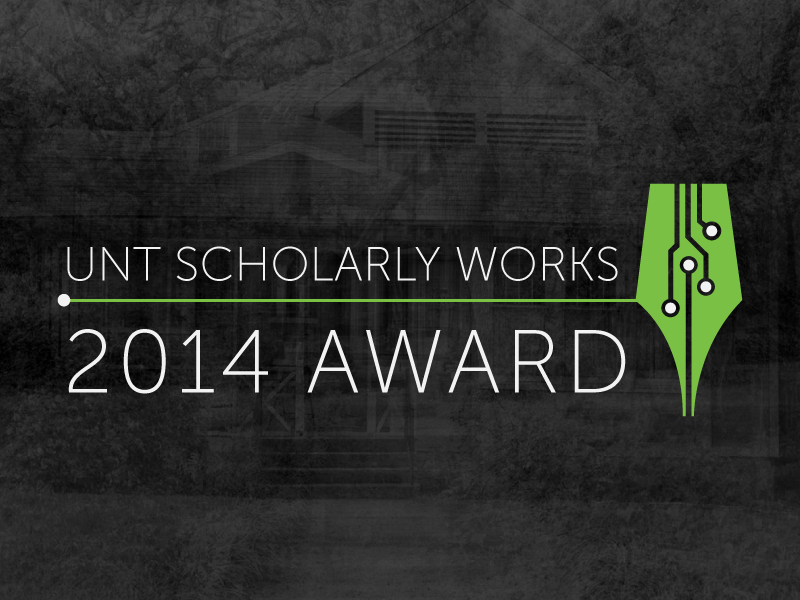
UNT Scholarly Works Outstanding Contributor Award 2014 Winner
About the Award This award recognizes a researcher who has made significant contributions to the UNT Scholarly Works institutional repository over the last year (April 1st 2013 through March 31st 2014). Significance is determined by a variety of characteristics including: donating the entirety, or a major portion, of a researcher’s scholarly corpus; donating a large number of individual titles; or donating research materials that demonstrate a significant scientific advance or societal impact. Employees of the UNT Libraries are ineligible for this award. 2014 Winner Dr. Marijn Kaplan Dr. Marijn Kaplan is a professor of French in the UNT World Languages, Literatures, and Cultures Department. Her research focuses on eighteenth-century French women writers, gender studies, cultural studies, epistolary fiction, and correspondence. She has published extensively on eighteenth-century women writers, notably Marie Jeanne Riccoboni and Francoise de Graffigny. Dr. Marijn Kaplan’s research work is available in the UNT Scholarly Works institutional repository. digital_libraries_honors_and_awards
Posted:
04/17/2015
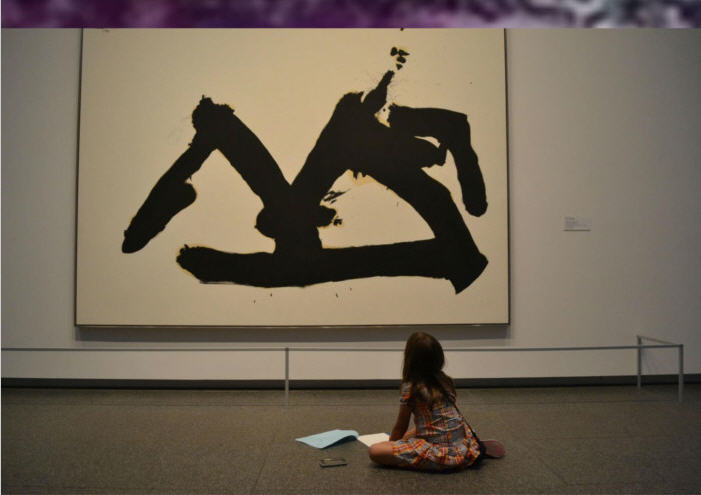
The Innovative ETD Award 2014 Winners
Jessica Fuentes, Master of Arts (Art Education), College of Visual Arts and Design (August 2013): In her master’s thesis entitled: “Learning From Each Other: Narrative Explorations of Art Museum Self-guided Materials,” Jessica Fuentes explored self-guided materials in art museums in the North Texas area. Jessica engaged in collaborative arts-based and arts-informed narrative inquiry with her six-year-old daughter, and then they created collaborative works of art based on their experiences, which acted as both data collection and analysis. Artist, mother, and educator, Jessica Fuentes holds a BA in Art and Performance from the University of Texas at Dallas and an MA in Art Education from the University of North Texas. Currently, she is the Director of Education for Art This Week, spearheading the development of educational videos and resources for young children. Jessica is also the Center for Creative Connections Gallery Coordinator at the Dallas Museum of Art, where she researches works of art and assists in the development of self-guided gallery activities. Art education is a passion for Jessica and it infuses her life; when not working, she is often with her daughter enjoying an art museum or making art in their home studio. Joshua Kimball Harris, Doctor of Philosophy (Composition), College of Music (December 2013): Sunken Monadnock is a scripted combination of three modular musical surfaces. In his Doctoral dissertation, entitled: “Sunken Monadnock: A composition for flute, clarinet, bassoon, violin, violoncello, electric guitar, piano, percussion, three female vocalists, and computer,” Joshua Harris incorporated visual metaphors including Shakir Hassan Al Said’s mystical semiotics, Jasper Johns’s crosshatch prints, and Wassily Kandinsky’s theory of abstraction. The circle and spiral, especially, play influential roles in Sunken Monadnock as reflected by musical applications of repetition, rotation, compression/rarefaction, and endlessness. The nature of the work’s formal counterpoint requires an innovative approach to the score, which consists of five sections, each of which reflects a different approach to the aural surface (i.e., to the traversal of time). The two outer sections are traditionally scored, but the three sections in the middle—labeled “Surfaces”—are played simultaneously by three subsets of the ensemble. The piece is approximately 22 minutes long. The UNT Libraries is pleased to present the 2014 UNT Libraries’ Most Innovative Dissertation award to Joshua Harris. digital_curation_unit_honors_and_awards
Posted:
04/16/2015
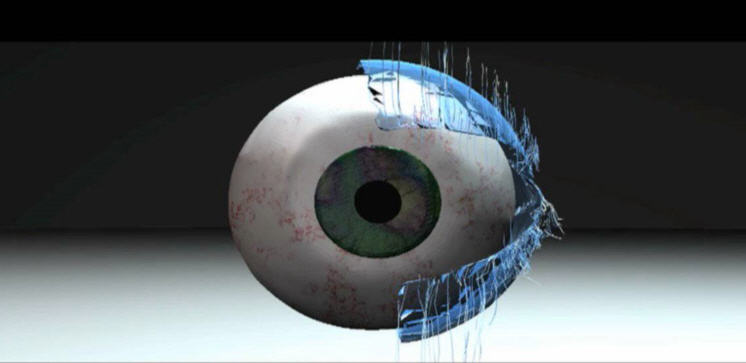
The Innovative ETD Award 2013 Winner
Stephen Lucas, Master of Music (Composition), College of Music (December 2010): In his master’s thesis “Critical Discussion of Pleroma: A Digital Drama and Its Relevance to Tragic Form in Music,” Stephen Lucas demonstrated the effective use of digital animation (combined with symphonies by Beethoven and Mahler) to present an original dramatic narrative that evokes both the classical form of tragedy and the concept of perceptual paradox. His work can be downloaded from our digital library system, and a copy of the dramatic text is included to supplement the multimedia production. Stephen has presented the video work at a UNT concert and at a separate national electronic music conference. He also maintains an online video hosting page. Stephen Lucas is presently a PhD Candidate of Music Composition at UNT, and we look forward to continuing to host and make his innovative research works available as open access to our global ETDs users. It is our great pleasure to present the very first (2013) UNT Libraries’ “Most Innovative ETD” award to Stephen Lucas. digital_curation_unit_honors_and_awards
Posted:
04/16/2015

New Public Access Requirements for NSF-Funded Research / FASTR Introduced in Congress
The National Science Foundation (NSF) announced its plan for providing public access to results of NSF-funded research. The plan (which is set to be implemented sometime in 2016) requires final versions of manuscripts and papers: Be deposited in a public access compliant repository designated by NSF; Be available for download, reading and analysis free of charge no later than 12 months after initial publication; Possess a minimum set of machine-readable metadata elements in a metadata record to be made available free of charge upon initial publication; Be managed to ensure long-term preservation; and Be reported in annual and final reports during the period of the award with a persistent identifier that provides links to the full text of the publication as well as other metadata elements. Public Access to Results of NSF-funded Research, http://www.nsf.gov/news/special_reports/public_access/ accessed on March 30, 2015. You can receive updates on the NSF Public Access Initiative by subscribing to the NSF System Updates listserv - send an email to: system_updates-subscribe-request@listserv.nsf.gov The Fair Access to Science and Technology Research Act (FASTR) was reintroduced in Congress on March 18, 2015. This is a bipartisan bill that would require certain federal departments and agencies to make research results funded by those departments and agencies freely available to the public. If passed, this bill will increase access to federally-funded research to scholars worldwide. You can read the full text of the bill here: https://www.congress.gov/bill/114th-congress/senate-bill/779/text research_support_services_in_the_news
Posted:
03/30/2015
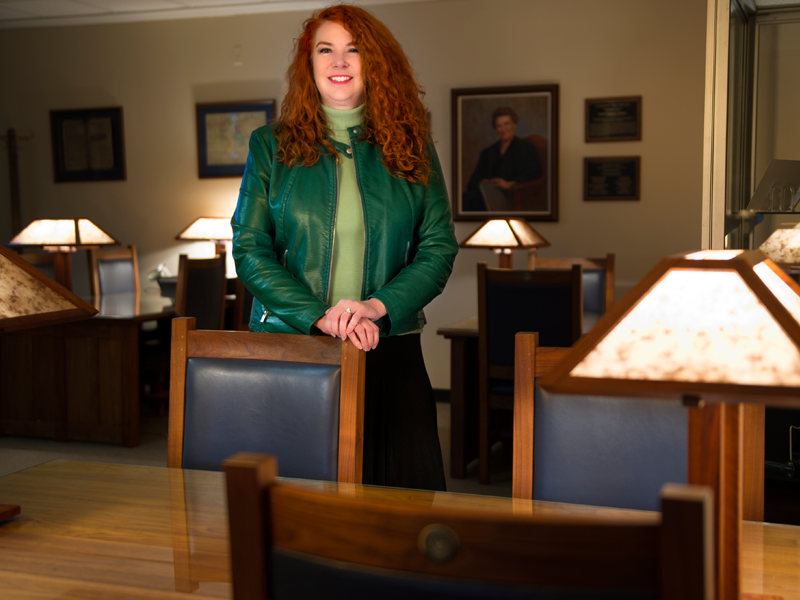
Dreanna Belden Elected President of the Texas Association of Museums
Dreanna Belden, assistant dean for external relations at the UNT Libraries, is making history as the first librarian to be elected president of the Texas Association of Museums. Dreanna Belden, assistant dean for external relations at the UNT Libraries, is making history as the first librarian to be elected president of the Texas Association of Museums. Belden’s two-year term began March 1, and her term ends in February 2017. “It’s a tremendous honor and a big responsibility,” said Belden about leading the association. “I feel deeply honored that they trust me to do this when I am not your typical museum person. It’s also a reflection of UNT’s significant presence in the museum community through the impact of the Portal to Texas History.” Used by millions of users each year, the UNT Libraries’ Portal to Texas History offers free access to Texas historical materials, including rare maps, photos and archives. Belden said she plans to focus on growing the museum association’s membership base and making the association more financially sustainable. Belden’s involvement with the organization reaches back to 2005 when she first joined as a member. I In 2011, she was the first librarian elected to its volunteer managing board, the TAM Council, She also was the association’s elected vice president for development from 2013 to 2015. To learn more please see the UNT InHouse article, UNT librarian picked to lead museum group. external_relations_in_the_news_honors_and_awards
Posted:
03/23/2015
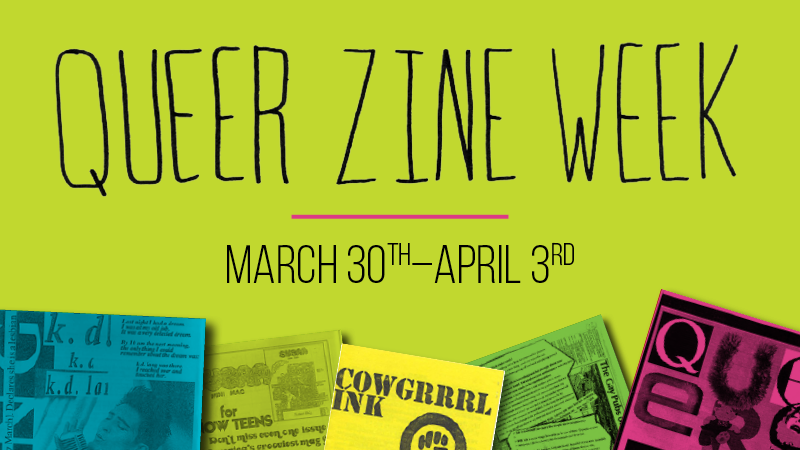
UNT Libraries partner with the Pride Alliance to present Queer Zine Week
The UNT Libraries and the UNT Pride Alliance are excited to host a week’s worth of events celebrating queer zines and the people who make them. Featuring workshops and web chats with zine makers, zine librarians, and digital archivists preserving zines from around the country, Queer Zine Week has something for everyone! Monday, March 30, 6-7 p.m. Web chat with Kelly Shortandqueer of the Denver Zine Library (Eagle Commons Library, Sycamore Hall 119, and Online) The Denver Zine Library opened in 2003 and houses over 10,000 different zines from all over the world. They are an all-volunteer run nonprofit organization. Kelly Shortandqueer, a co-founder of the DZL, has been publishing shortandqueer zine since 2004, incorporating his queer and transgender identities into his writing about lots of other subjects. Tuesday, March 31, 3:30-5:30 p.m. Zine-Making Workshop with Spencer Keralis and Courtney Jacobs (UNT Pride Alliance, Sage Hall 328) Spencer and Courtney are rare book enthusiasts who love to teach others how to make books! Learn pamphlet stitch, and make your own zine. Wednesday, April 1, 5:30-9:00 p.m. QPOC Zine Forum with the Feminist Majority Leadership Alliance (UNT Willis Library, Forum 140) Cancelled Thursday, April 2, 6-7 p.m. Web chat with Milo from the Queer Zine Archive Project (NEW LOCATION: Willis Library, Room 229, and Online) Milo is one of the co-founders of QZAP, the Queer Zine Archive Project. Ze’s been making zines in some form or another since 1991, and has been facilitating QZAP for the past 10 years. QZAP started as a digital project and is currently housed in an apartment in Milwaukee. Comprising of 1200+ individual zines and pieces of ephemera, the collection covers 15 countries and has material in 12 different languages. Friday, April 3, 2-3 p.m. Web chat with Jennifer Hecker of the Austin Fanzine Project (NEW LOCATION: Willis Library, Room 229, and Online) The Austin Fanzine Project started as a digitization and transcription project intended to improve access to the documents of a recently-historical subculture – the Austin, Texas underground music scene of the 1990s. The project has blossomed into a sandbox for creative experimentation with digital archives and digital humanities methods and tools. Click here to view registration information for all online events. All events are free and open to the public. Visitors to campus, be sure get info on parking at UNT! public_services_in_the_news
Posted:
03/19/2015

March 26: Promote & Organize your Research!
Improve your research and learn more about using citation data effectively with ThomsonReuters on March 26. Improve your research and learn more about using citation data effectively with ThomsonReuters! WHEN: March 26, 2015 Discovery Park 10:00-11:00 a.m.: Promoting Your Research Using Citation Data 11:00-12:00 p.m.: Introduction to EndNote online Willis Library Room 443 1:30-2:30 p.m.: Promoting Your Research Using Citation Data 2:30-3:30 p.m. : Introduction to EndNote online eresources
Posted:
03/11/2015
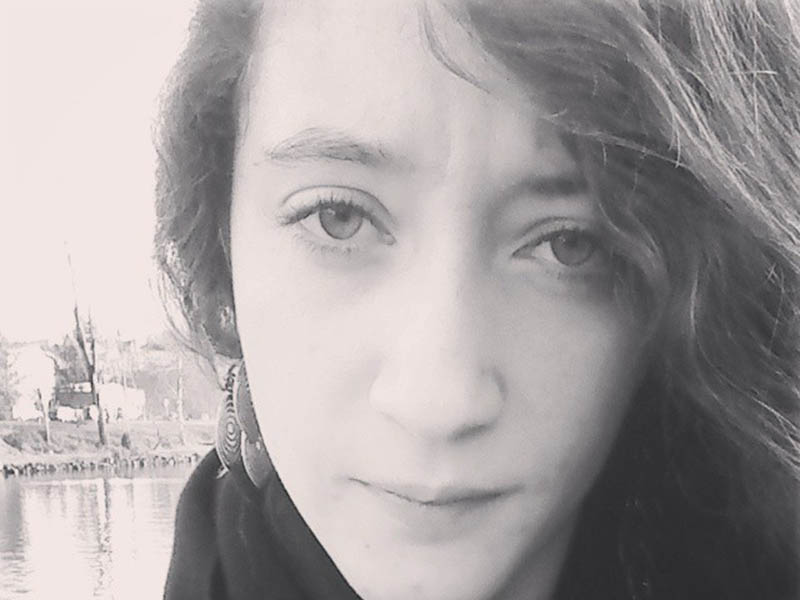
Omeka Exhibition Assignments for AEAH 5813: Visual Culture of Refugees and Migrants
In Fall semester 2014, Professor Jennifer Way in the department or Art History and Art Education invited UNT Libraries Public Services to collaborate on a classroom experiment to encourage her students to develop digital exhibits as an alternative to the traditional seminar paper. Digital Humanities Coordinator Spencer Keralis and Art Reference Librarian Rebecca Barham were embedded with Dr. Way’s graduate art history seminar. The students used Omeka, an online exhibit platform developed by the Roy Rozenzweig Center for History and New Media at George Mason University, to build their exhibits. Rebecca and Spencer delivered a series of mini-lectures for the students to introduce the platform, and to encourage the students to think about metadata, copyright, and fair use. Professor Way offered this reflection on the pilot project: The course topic involved questions concerning what visual representations tell us about refugees’ lives and identities, how and why representations emphasize certain things about refugees, how representational processes turn refugees into subjects, and for whom do they do this. I wanted students to develop research projects that inquired about these questions critically. Moreover, having the students each research and create an exhibition through Omeka was a great way for them to become involved with the very material that makes up visual representations – works of art, photographs, and photographs and other visual media that are published and distributed in mass print and electronic media. Omeka-based exhibitions provided a welcome alternative to writing papers, too. Importantly, creating these online exhibitions challenged students to pursue image-centered research, something that proved new to many of them. At the same time, students learned to develop narratives that situated their images in relevant historical, social and cultural contexts. By visiting with us over a nine week period, Spencer and Rebecca baby-stepped us into using Omeka. During each thirty minute visit, they taught us more about implementing Omeka’s capabilities and about related issues such as digital humanities, image archives, and copyright. Outside of class, students also connected with Rebecca for research assistance and with Spencer for fine tuning the construction of their exhibitions. The result was a wonderful range of projects delving deeply into course themes. The information and demonstrations that Spencer and Rebecca delivered always enriched our research and technology. Ultimately, Spencer and Rebecca gave us additional layers of learning and skills that we otherwise would not have had. I enjoyed the collaborative aspect and look forward to developing other projects that connect my courses and students with the UNT Libraries. Among the topics featured in students’ exhibits were Peter Hiatt’s exploration of refugees’ self-expressions on social media collected in “Hashtag Refugee,” and Jessica Burnham’s “Once a Lost Boy, Always a Lost Boy?” which collects book covers depicting Sudan’s refugee children. The Public Services Division is grateful to Dr. Way and her students for taking part in this experience with us and, like Dr. Way, look forward to further collaborations in the future. public_services_in_the_news_new_service
Posted:
03/03/2015
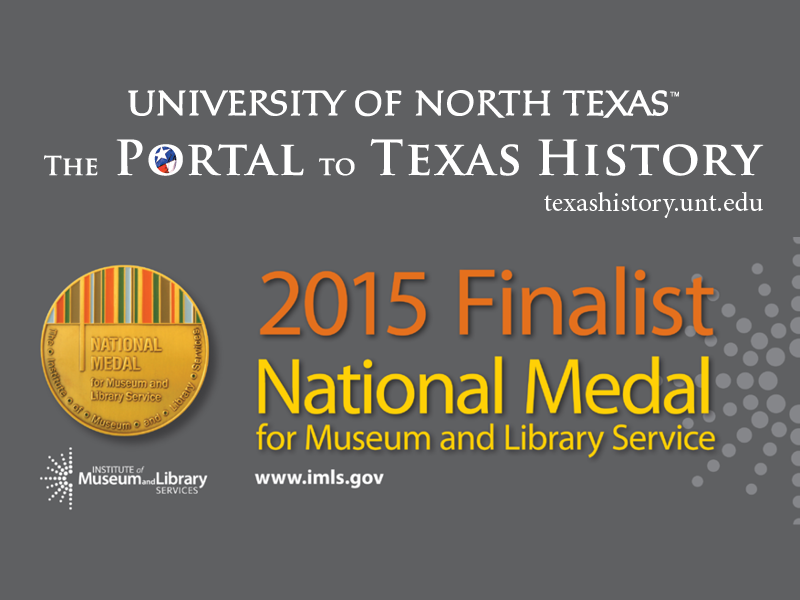
UNT's Portal to Texas History Named as a National Medal for Museum and Library Service Finalist
UNT’s Portal to Texas History named as a National Medal for Museum and Library Service Finalist Share Your Story of how UNT’s Portal to Texas History has touched your life on the IMLS Facebook Page! The National Medal for Museum and Library Service is the nation’s highest honor given to museums and libraries by the Institute of Museum and Library Services in recognition of exceptional service to the community and for making a difference in the lives of individuals, families, and communities. We are grateful for the support and contributions of our more than 280 partners, and the UNT Portal to Texas History team is honored to be recognized as a finalist for the 2015 National Medal award. This year’s finalists include individual public libraries, special and research libraries, a zoo, science museums, botanical gardens, and many other types of institutions that exemplify the great diversity of libraries and museums across the country. This honor recognizes the contributions of the Portal to Texas History in engaging a broad public audience that includes our faculty and students, our collaborative partners, as well as a truly national and global audience. The online materials in the Portal are freely available to the public and encompass books, photographs, artifacts, posters, artwork, maps, newspapers, letters, manuscripts, video, audio, and other historic materials. We are grateful for your support and are honored to be recognized as a 2015 finalist. “Museums and libraries are the lifeblood of our communities, serving as trusted providers of critical resources, educational training, skills development, and civic and cultural enrichment,” said Maura Marx, acting director of the Institute of Museum and Library Services. “We salute UNT’s Portal to Texas History for exemplary leadership in promoting lifelong learning while engaging and inspiring the public.” “The Portal to Texas History enables access to the records, history, and culture of Texas,” said Dr. Martin Halbert, dean of UNT Libraries, “and it defines the important social context of our state in entirely new ways that have far-reaching impact.” The National Medal winners will be named later this spring, and representatives from winning institutions will travel to Washington, D.C., to be honored at the National Medal award ceremony. Winning institutions also receive a visit from StoryCorps, a national nonprofit organization dedicated to recording, preserving, and sharing the stories of Americans of all backgrounds and beliefs. UNT’s Portal to Texas History is one of 30 finalists, of which ten will receive the National Medal. In acknowledgement of the National Medal’s celebration of institutions that are committed to community service, IMLS will feature the finalists on social media platforms and provide an opportunity for you to Share Your Story on the IMLS Facebook page. Visit the IMLS Facebook page and Share Your Story today! About the UNT Libraries With more than 7 million print and digital cataloged items in six separate facilities, the UNT Libraries are the heart of learning and research at UNT. The UNT Libraries has been nationally and internationally recognized for its emphasis on digital preservation. The Portal to Texas History, created by the libraries in 2002, received the 2013 Project of the Year award from the Texas Library Association. It was also chosen as one of the best online resources for education in the humanities by the National Endowment for the Humanities and named a Service Hub by the Digital Public Library of America. About the Institute of Museum and Library Services The Institute of Museum and Library Services is the primary source of federal support for the nation’s 123,000 libraries and 35,000 museums. Our mission is to inspire libraries and museums to advance innovation, lifelong learning, and cultural and civic engagement. Our grant making, policy development, and research help libraries and museums deliver valuable services that make it possible for communities and individuals to thrive. To learn more, visit www.imls.gov and follow us on Facebook and Twitter. external_relations_in_the_news_honors_and_awards_collection_highlight
Posted:
02/25/2015
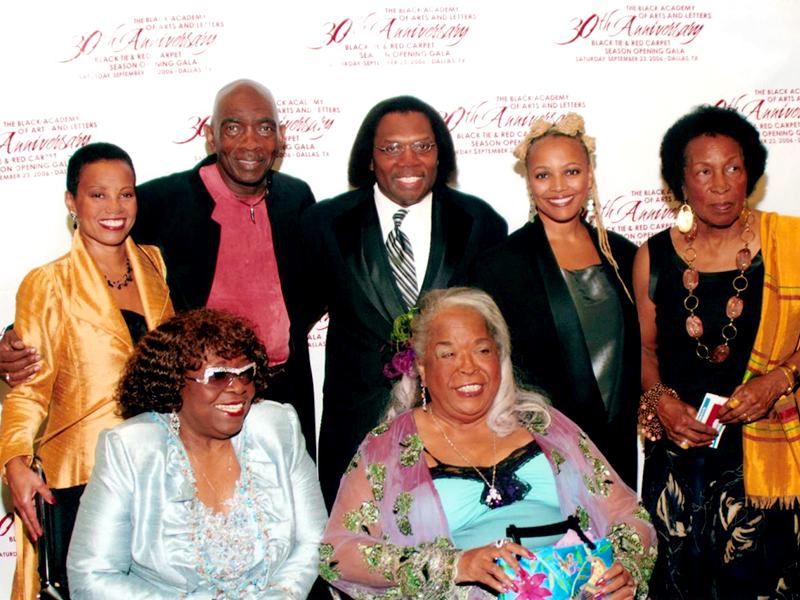
Special Collections to house archives from The Black Academy of Arts and Letters
During the past 38 years, a nonprofit cultural arts institution in downtown Dallas, The Black Academy of Arts and Letters, has hosted Academy Award nominees, Grammy winners and some of America’s most noted jazz musicians and comedians, as well as unknown performers who later became famous. During the past 38 years, a nonprofit cultural arts institution in downtown Dallas has hosted Academy Award nominees, Grammy winners and some of America’s most noted jazz musicians and comedians, as well as unknown performers who later became famous. Programs, posters, photos and video recordings from these performances at The Black Academy of Arts and Letters, and other items from the academy’s archives, will be housed at the UNT Libraries as part of its Special Collections. The agreement between the UNT Libraries and the academy, known as TBAAL, will be formally announced at 11 a.m. Feb. 9 at Dallas City Hall. TBAAL was founded in 1977 as the Junior Black Academy of Arts and Letters by Curtis King, who formed the academy in homage to the original Black Academy of Arts and Letters, which is now defunct. King had attended the organization’s national conference in 1972, where he met Alvin Ailey, Harry Belafonte, Ossie Davis, Ruby Dee and other noted African Americans in the performing arts. To learn more, see the UNT InHouse article UNT Libraries to house archives from Dallas cultural arts institution and browse the collection in The Portal to Texas History. digital_libraries_in_the_news_collection_highlight
Posted:
02/05/2015
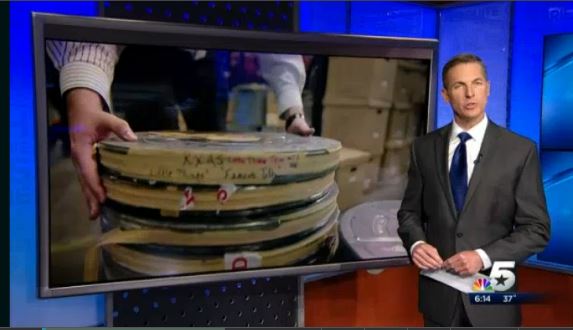
NBC 5 News at 6 PM features footage from NBC 5/KXAS News Collection
UNT Libraries house the complete news archive of NBC 5/KXAS (formerly WBAP), the oldest television news station in Texas. Most of the footage in the archive has not been seen since it originally aired, but a recent pilot project based at UNT makes news footage and scripts from five weeks in 1956 free to view online in the Portal to Texas History. Despite being small in scope, the pilot project demonstrates the rich historical content found in the NBC 5/KXAS Archive. During the week of January 12 - 16, 2015, the NBC 5 News at 6 PM featured footage from the NBC 5/KXAS Television News Collection pilot project. Each night reporters highlighted a different aspect of life in North Texas in 1956. Monday, January 12th: In a segment entitled “Big Things Ahead in DFW in 1956” DallasNews.com Digital Managing Editor Robert Wilonsky and NBC 5’s Brian Curtis demonstrated how the construction projects and concerns of 1956 shaped the north Texas we know today. Tuesday, January 13th: The struggle for civil rights was underway in North Texas in 1956. With segregation in place, African-American families faced challenges integrating into schools and neighborhoods. In his “North Texas in Black and White in 1956” segment, NBC 5’s Eric King introduced viewers to Lloyd Austin, now 91 years old, who experienced extreme persecution when his family moved to an all-white neighborhood in Fort Worth. Wednesday, January 14th: The year 1956 was one of the driest on record and Channel 5 filmed the results. Cooler temperatures brought rain but also severe weather. NBC 5 Chief Meteorologist David Finfrock shared the experiences of tornado victims and uncovered a town that no longer exists in “Covering Severe Storms in 1956.” Thursday, January 15th: In “Fashion Forward in the 50s” NBC 5’s Ellen Bryan showed the influence history had on women’s clothing and how Dallas icon Neiman Marcus played an important role in 1950s fashion. Myra Walker, Professor and Texas Fashion Collection Director at the University of North Texas contributed to this report. Friday, January 16th: “Eccentricities in North Texas” features a selection of human interest stories found in the NBC 5/KXAS archive, including a helicopter yo-yo, a rooster with horns, and a 38-year-old donut. Access to the NBC 5/KXAS Archive is extremely limited due to the fragile condition of the film and video. We need your help to raise the funds necessary to clear, repair, and digitize this important piece of North Texas history. The first phase of the digitization project involves the oldest portion of the archive, all on 16 mm film, dating from 1950-1979. It costs approximately $7,500 to digitize and permanently preserve one month of film. Please consider a tax deductible gift today to assist us in meeting our goal. special_collections_in_the_news_collection_highlight
Posted:
01/28/2015
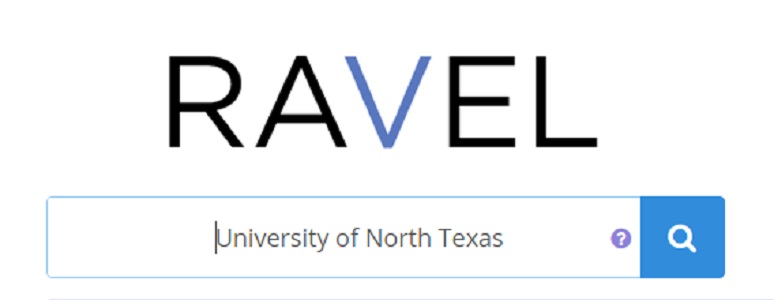
NEW! Ravel Law Database
Ravel Law indexes case law at the local, state and federal levels and provides a unique visualization tool to identify and contextualize U.S. case law. Search using either Boolean or natural language and then use the unique interactive map to adjust the focus and scope of your results. Ravel Law also provides context and information to make it easy to analyze and interpret your findings. Finally, you can annotate the text and export your notes from within the database. To access Ravel, you must create a personal account using a valid unt.edu email address.\ Go to https://www.ravellaw.com\ Click “Sign In” in the upper right corner\ Click the “Sign Up” button.\ Complete form using your UNT email address. If you don’t have a graduation date just type any future date.\ Click the “Create Account” button to create your account and begin searching! Check out the Quick Start Guide for a brief, printable introduction or visit Ravel Learn to find ideas, video tutorials, and more. eresources
Posted:
01/21/2015
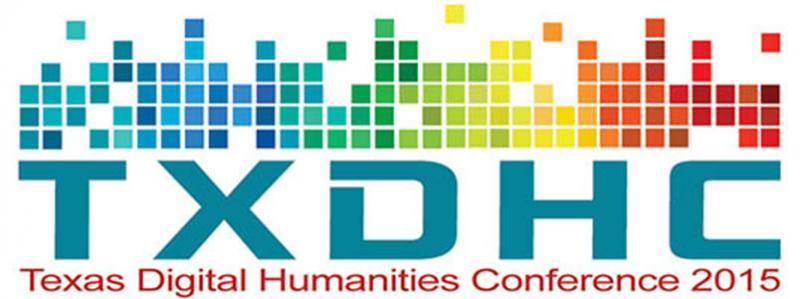
UNT Libraries and Digital Frontiers sponsor Texas Digital Humanities Conference 2015
The University of North Texas Libraries and Digital Frontiers are proud sponsors of the Texas Digital Humanities Conference 2015. We join conference hosts University of Texas at Arlington, including the College of Liberal Arts, UTA Libraries, and Departments of English, Linguistics, History, and Art and Art History as sponsors of the second annual conference of the Texas Digital Humanities Consortium (TxDHC). The conference will take place April 9-11, 2015 at the University of Texas at Arlington, and will include a Hackfest along with a variety of presenters. The conference features keynote speakers Alan Liu (University of California, Santa Barbara), Adeline Koh (Richard Stockton College), and George Siemens (UT-Arlington). TxDHC is an organization of Digital Humanities Initiatives, Centers, and Institutes in the State of Texas. Their mission is to promote digital research in the humanities disciplines and facilitate interaction amongst researchers working in the digital humanities both within the state, nationally, and internationally. The consortium was organized in 2013, with University of Houston, Rice, Texas A&M University, University of Texas at Austin, University of North Texas, and the University of Texas at Arlington as founding members. The first Texas Digital Humanities Conference was held in 2014 at the University of Houston. The call for proposals is open through January 27, 2015. public_services_in_the_news
Posted:
01/20/2015
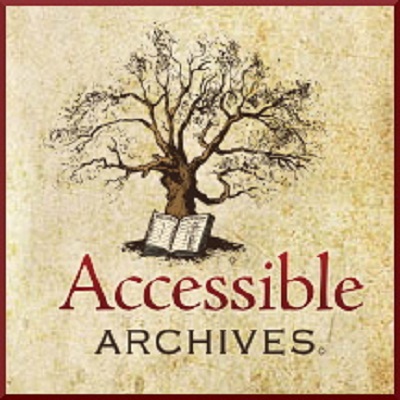
NEW! Accessible Archives
This new database contains eyewitness accounts of historical events, vivid descriptions of daily life, editorial observations, commerce as seen through advertisements, genealogical records and much more… Eyewitness accounts of historical events, vivid descriptions of daily life, editorial observations, commerce as seen through advertisements, genealogical records and much more! Accessible Archives contains rich, comprehensive material found in leading periodicals and books that relate to a wide range of topics in American history from slavery to women’s rights, state and county records to style and fashion in the nineteenth century. To get started visit the User Manual or browse through the Collections and Coverage to find out what is available. eresources
Posted:
01/20/2015
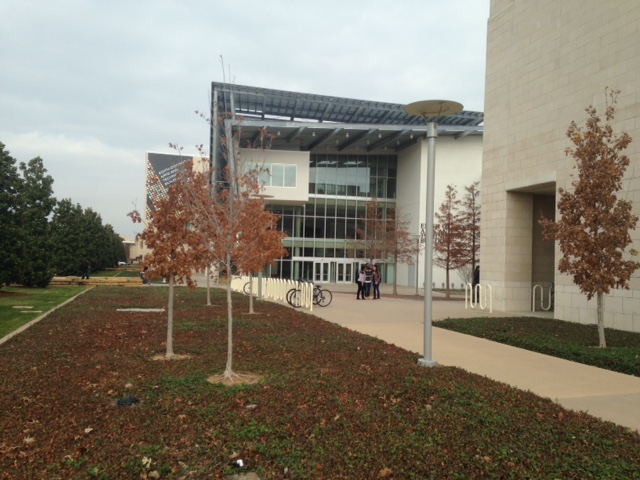
Digital Frontiers 2015 hosted by University of Texas at Dallas!
We are excited to announce that Digital Frontiers 2015 will be hosted by the School of Arts and Humanities and the Emerging Media and Communication program at University of Texas at Dallas. The conference will be held in the UT-D University Union and the beautiful new Edith O’Donnell Arts and Technology Building at the center of the UT-D campus. The conference will take place September 17-19, 2015, and the Call for Proposals will be available after February 1st. Digital Frontiers is a project of the UNT Libraries to explore creativity and collaboration across disciplinary boundaries in the arena of public humanities and cultural memory. Established in 2012 to respond to the need for an affordable, high-quality conference that addressed the emerging field of digital humanities from a variety of perspectives, Digital Frontiers is a truly interdisciplinary experience. The conference brings together scholars and students, librarians and archivists, genealogists and public historians to share their experience of using digital resources in the humanities. An annual conference and THATCamp, and periodic webinar conversations with national leaders in digital humanities highlight interdisciplinary efforts in the development and use of digital resources for humanities research, teaching, and learning. The UT-D Department of Arts and Technologies joins the UNT Libraries, the TWU Libraries, as major partners in the Digital Frontiers Project, along with sponsors the Portal to Texas History and the Texas State Historical Association. For more information on the conference, visit the Digital Frontiers website, or email digitalfrontiers@unt.edu public_services_in_the_news
Posted:
01/20/2015